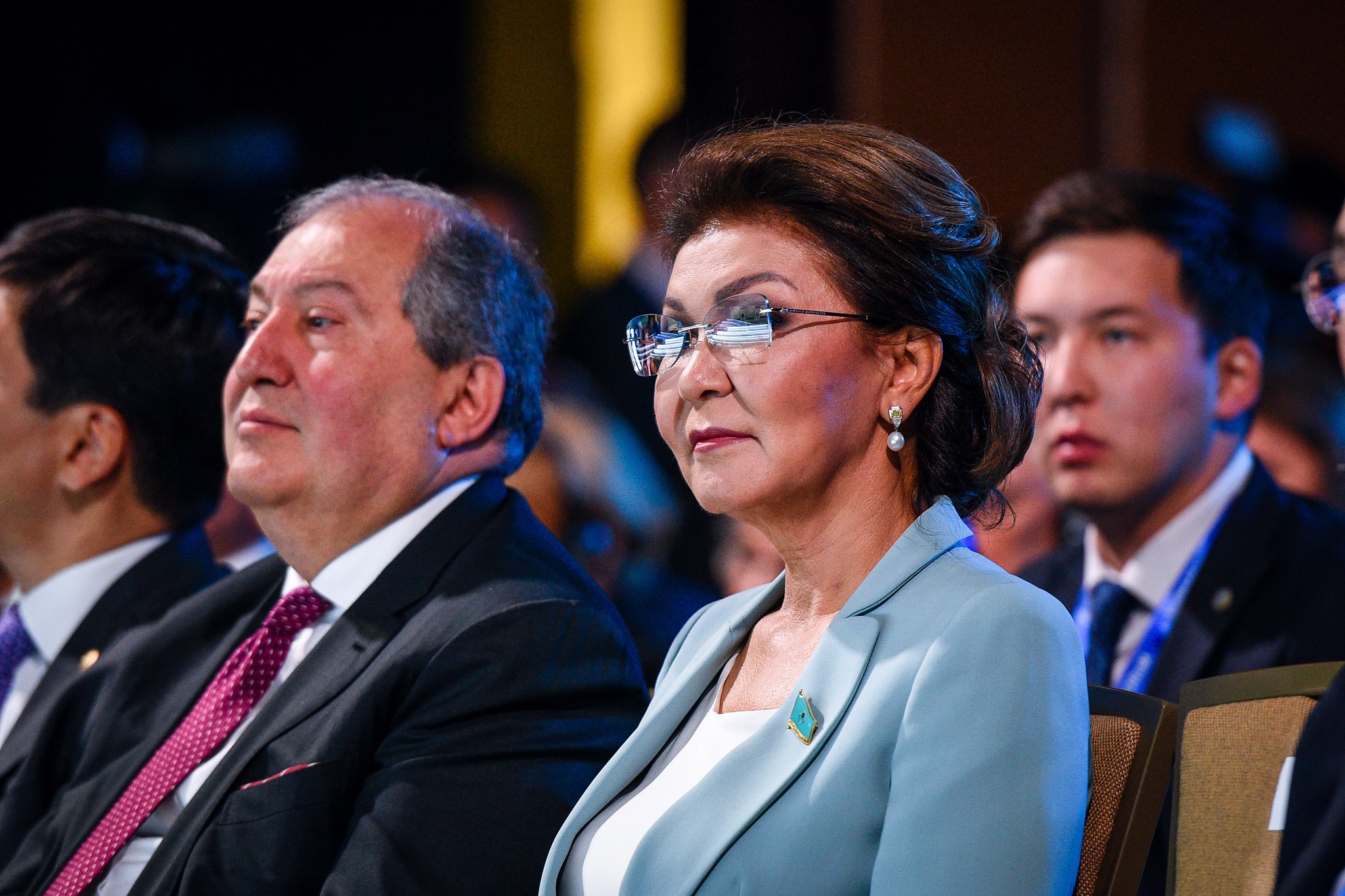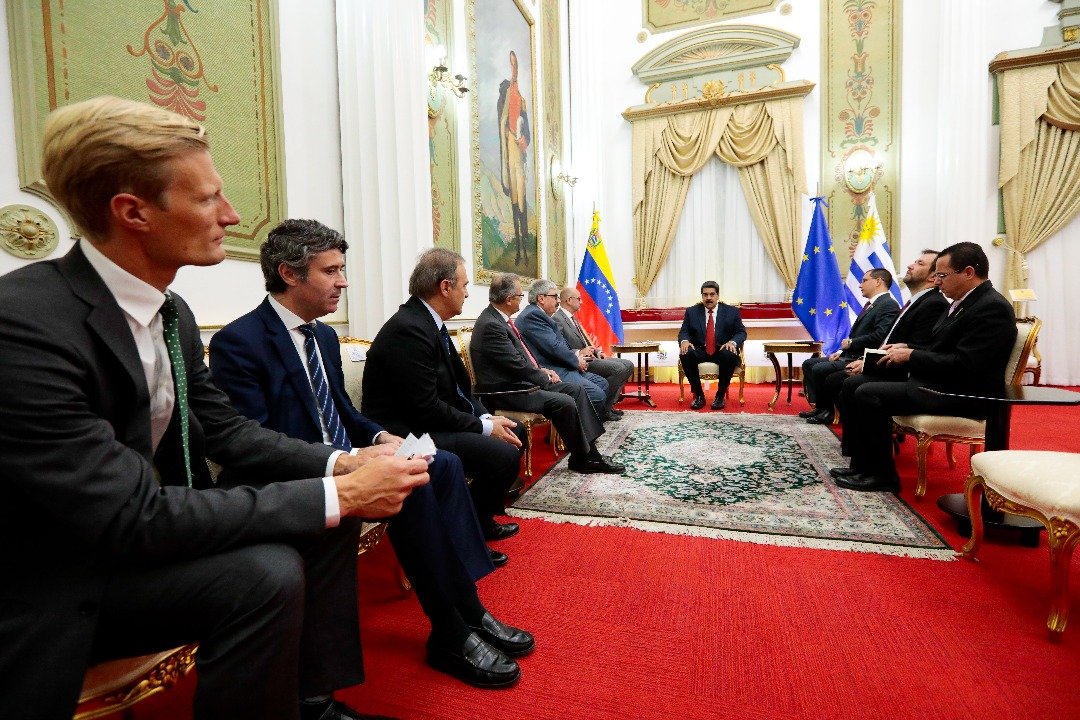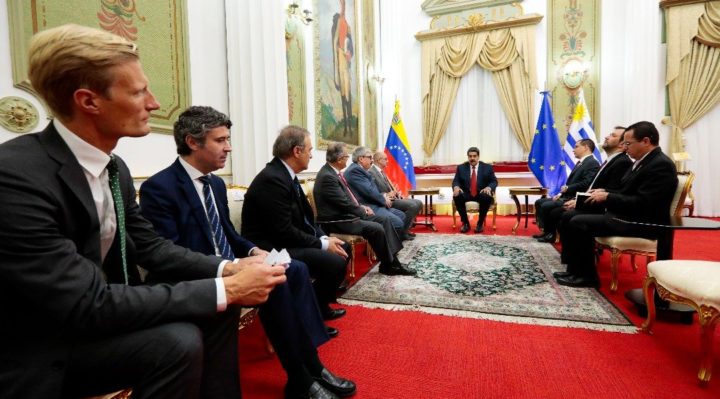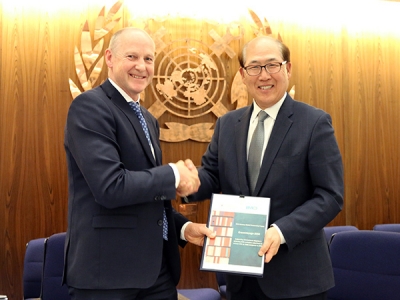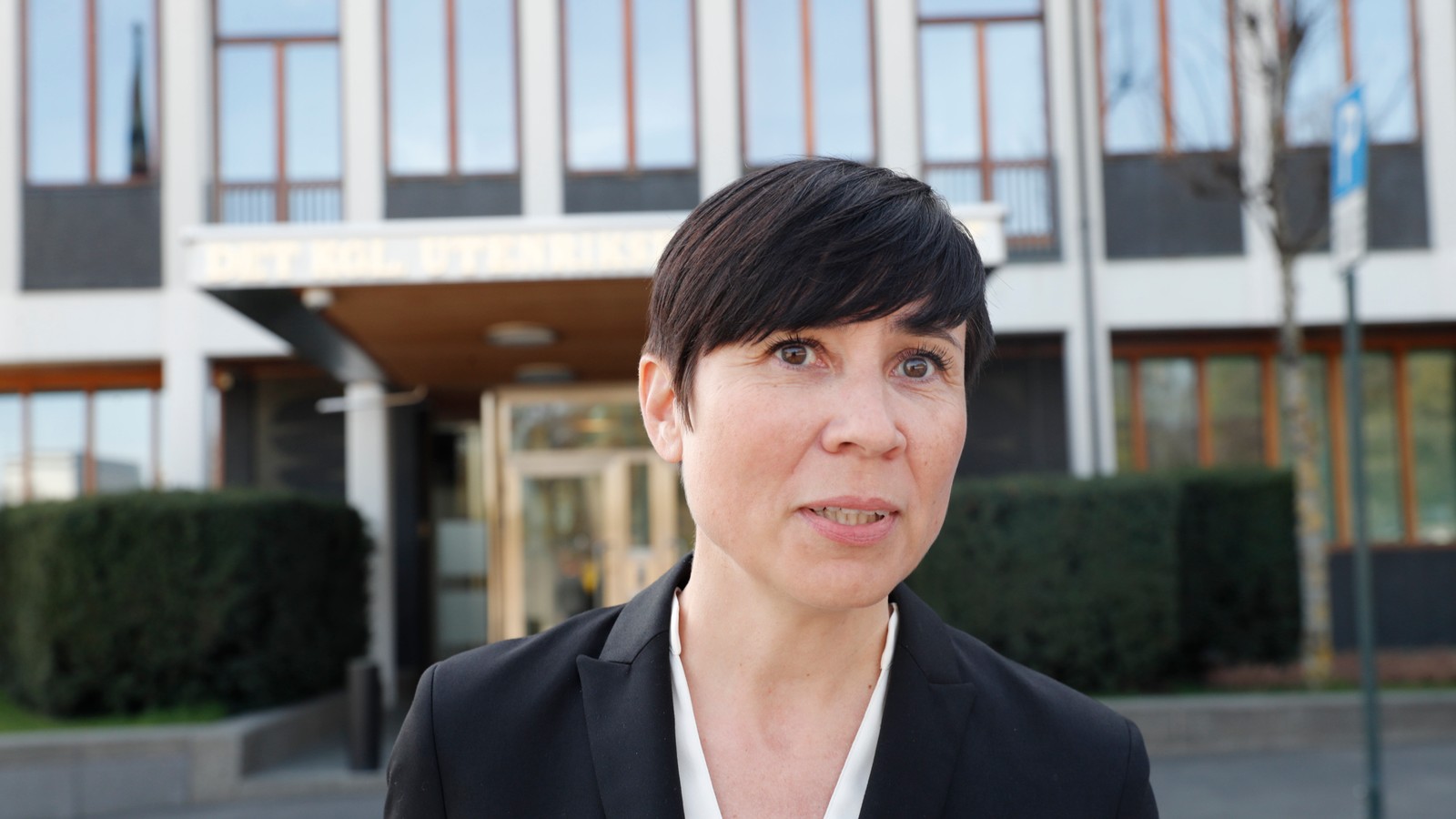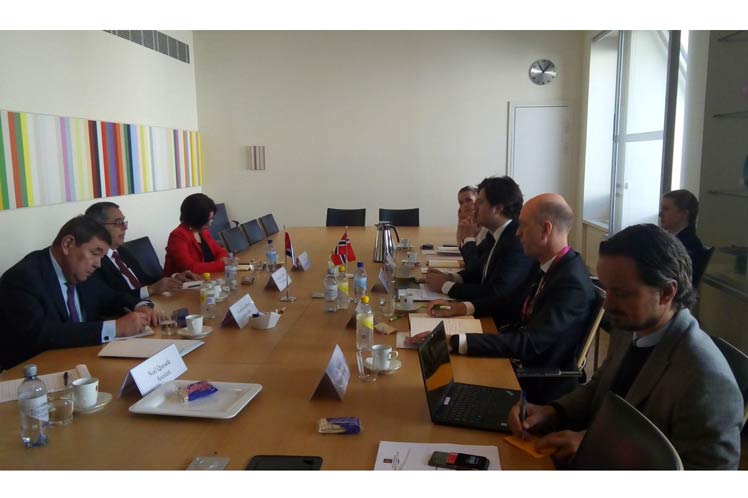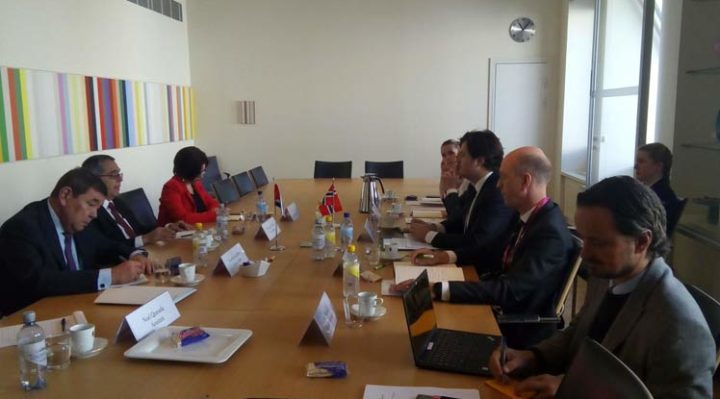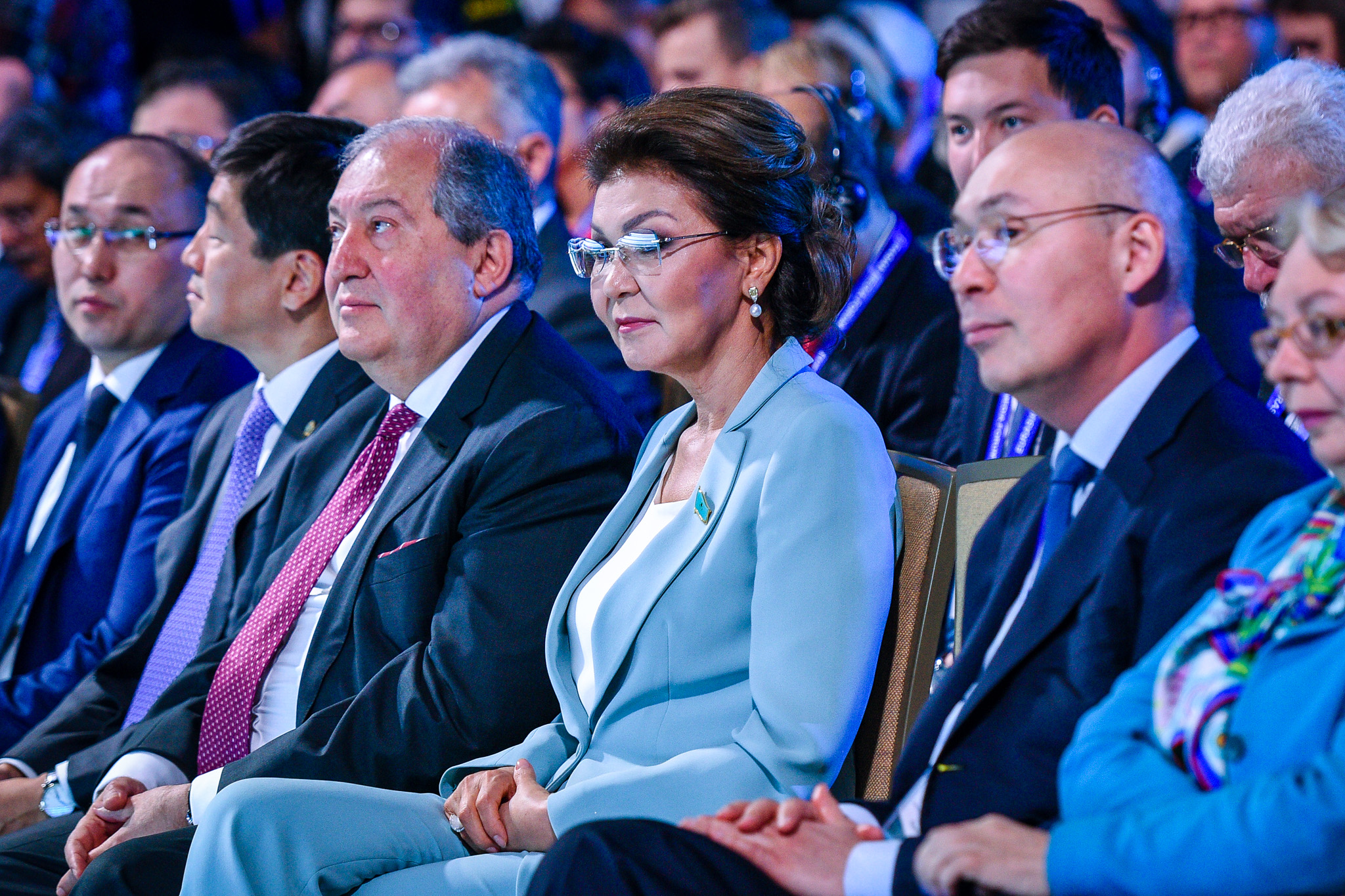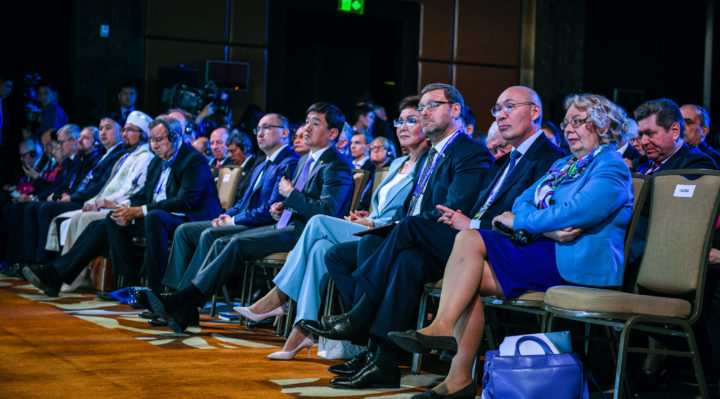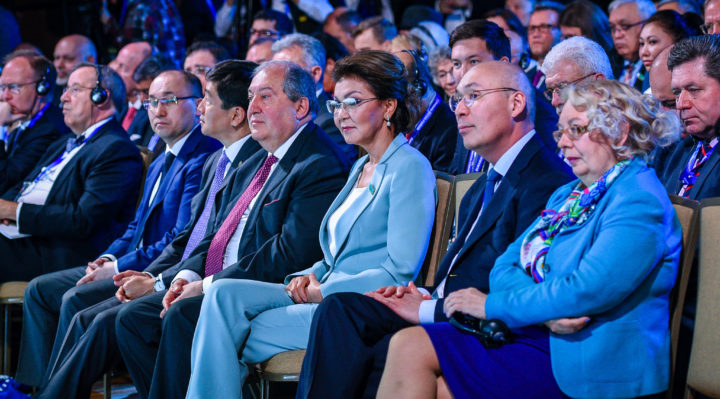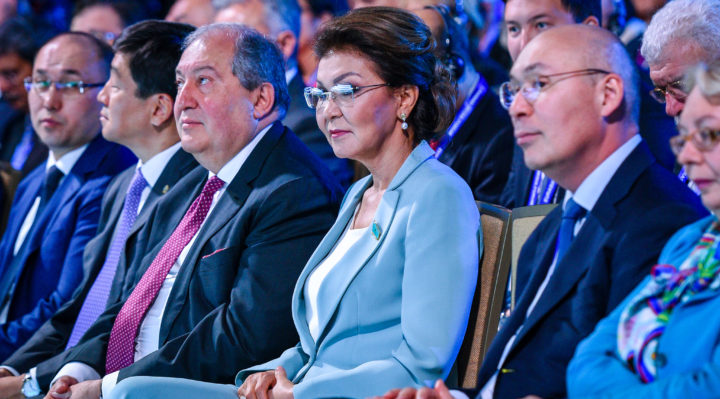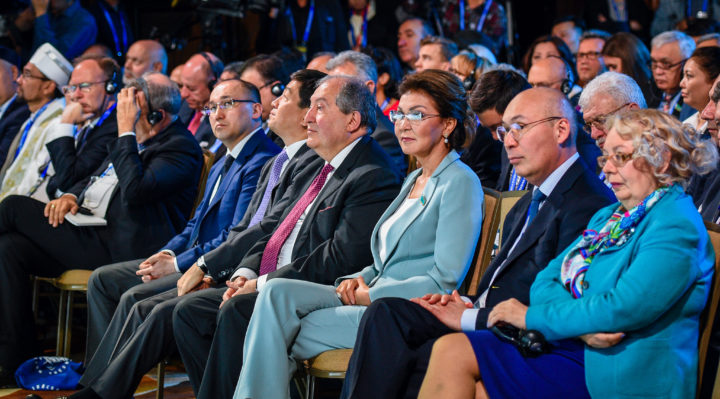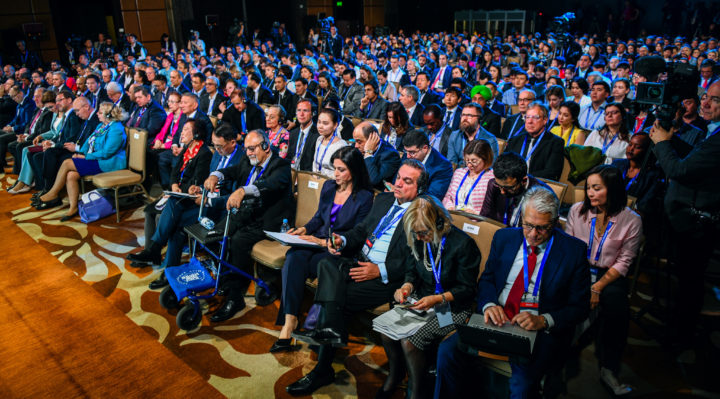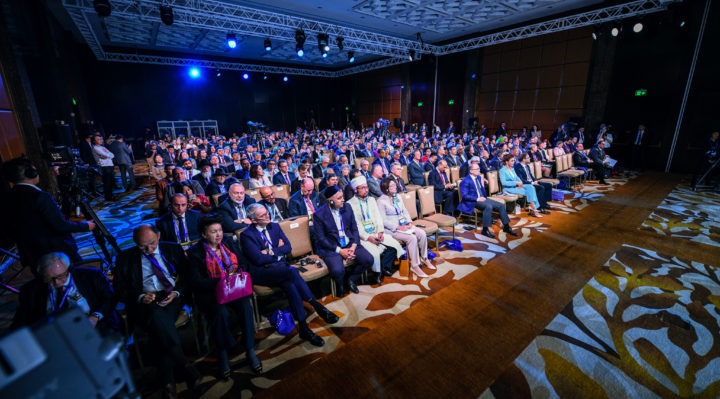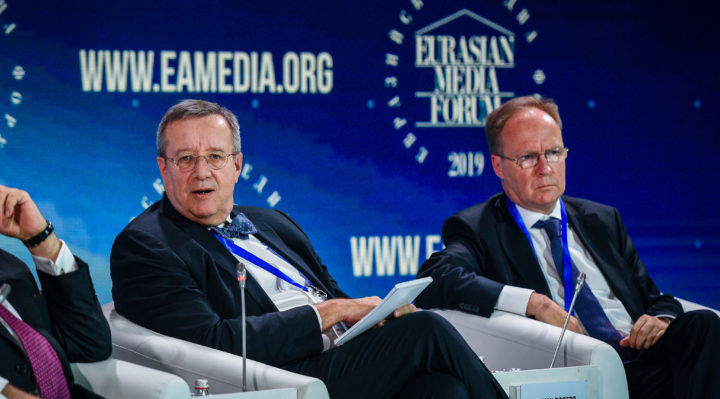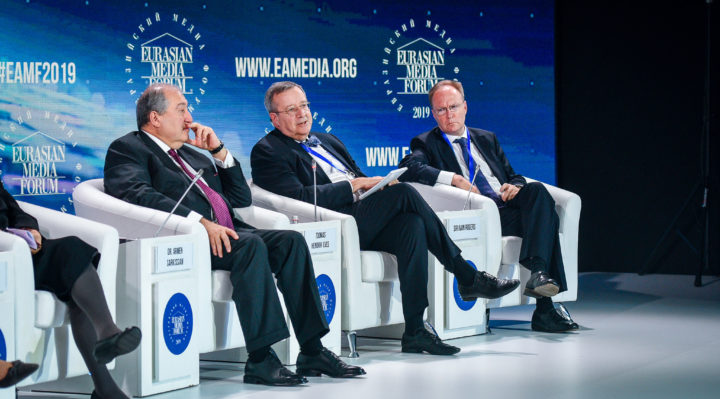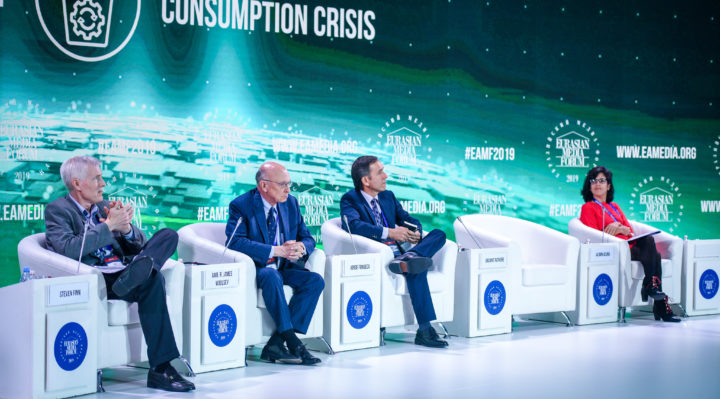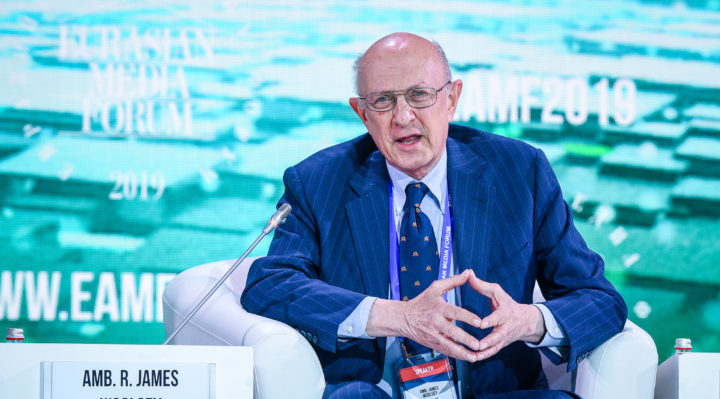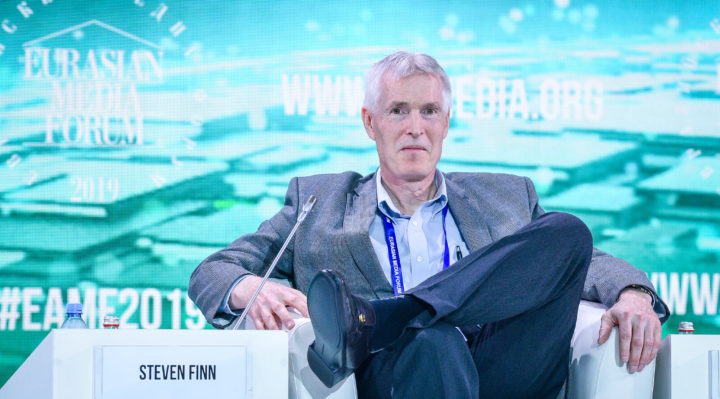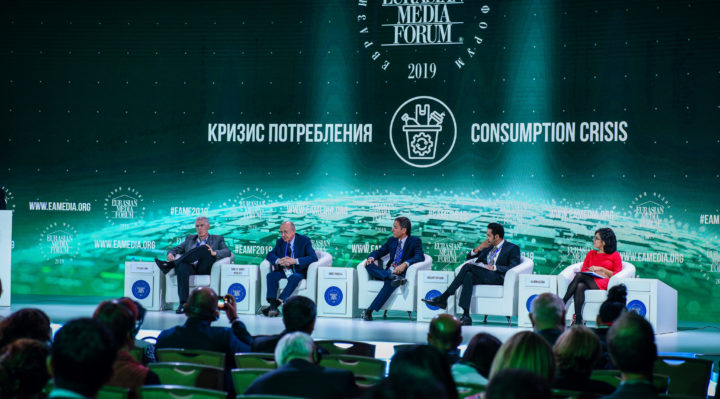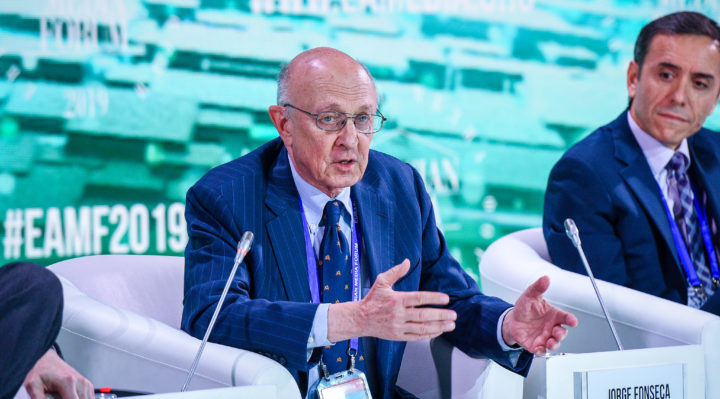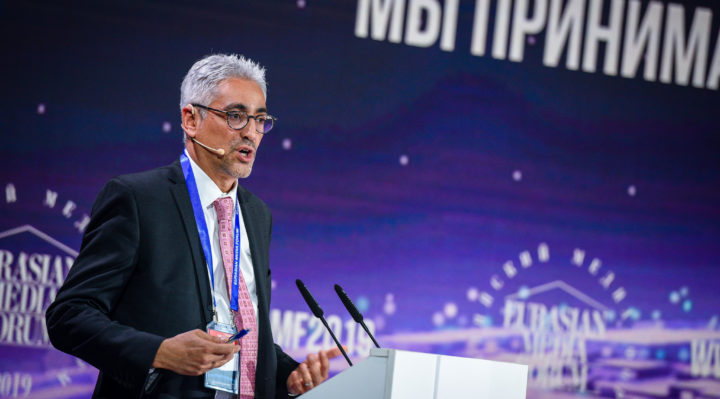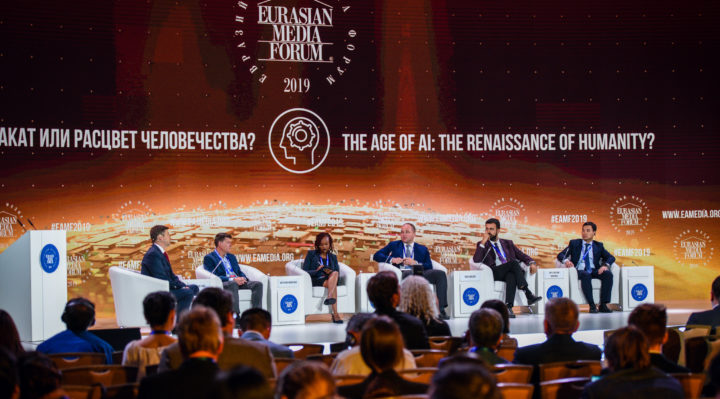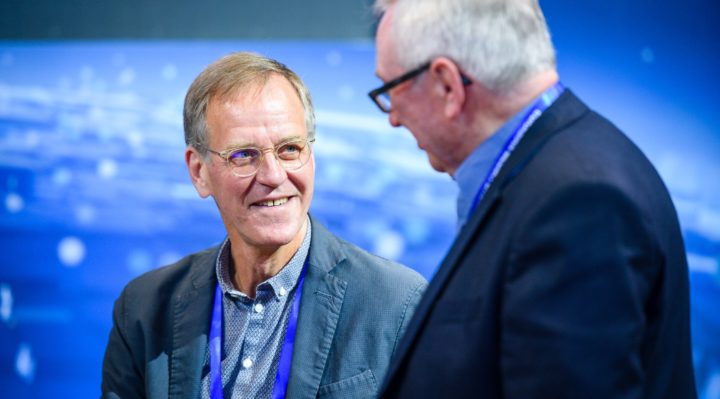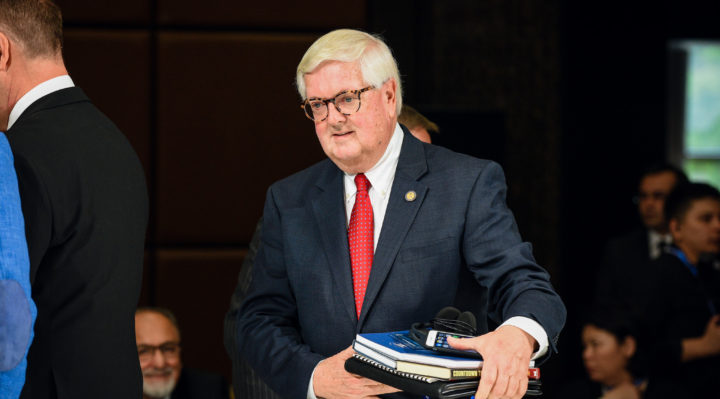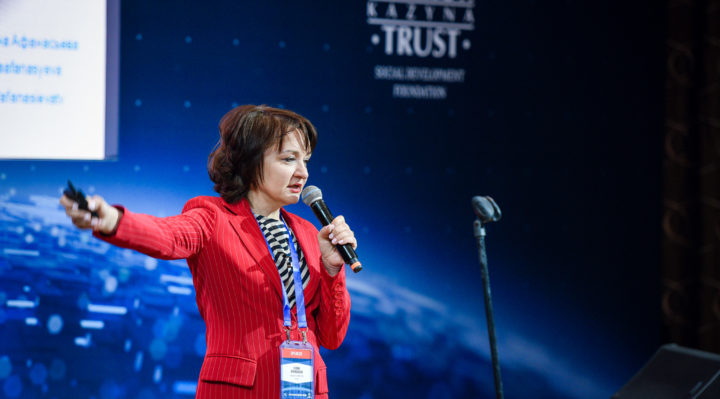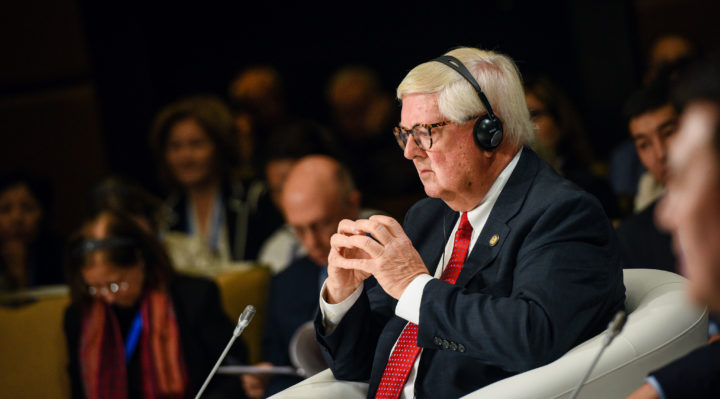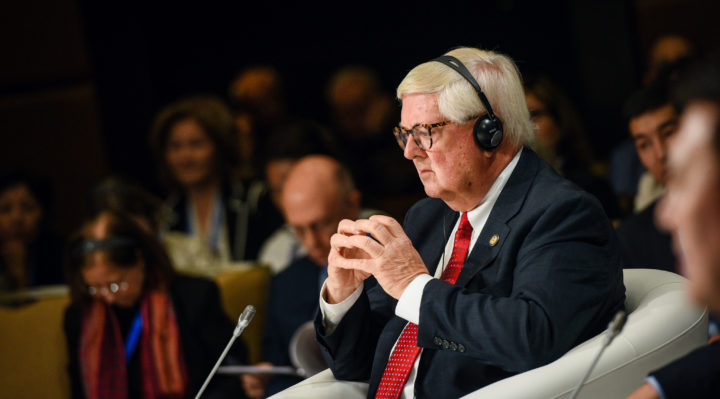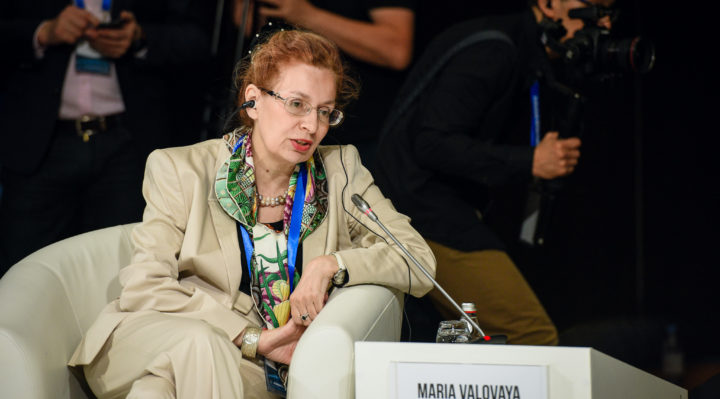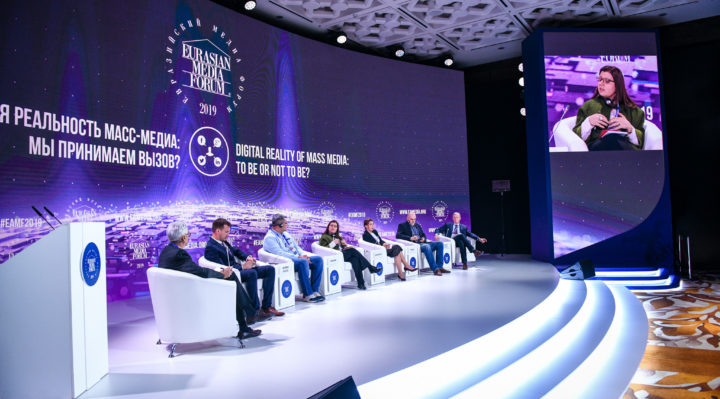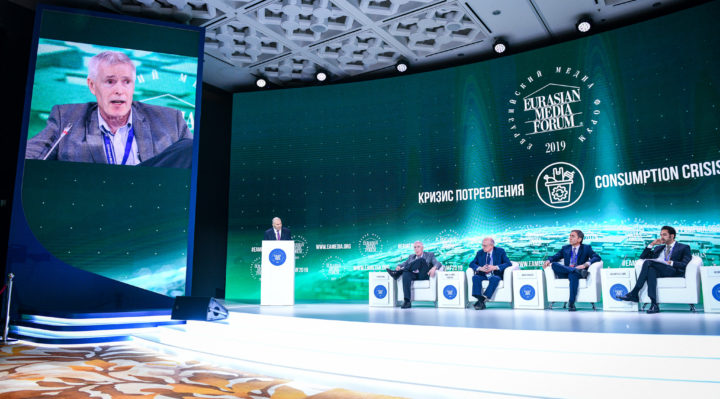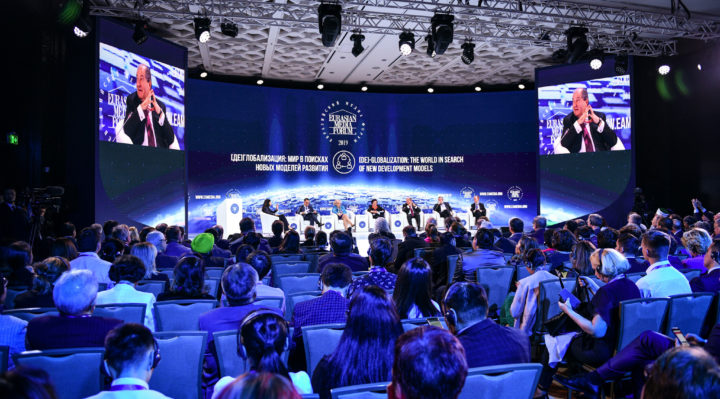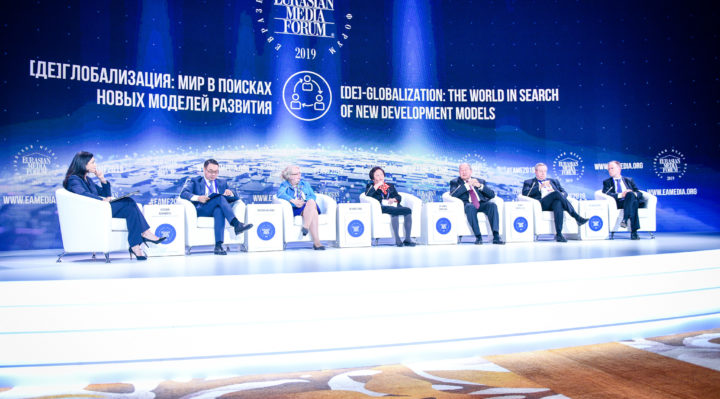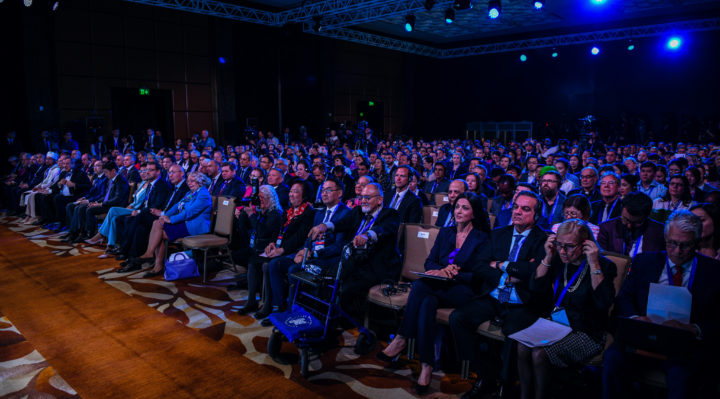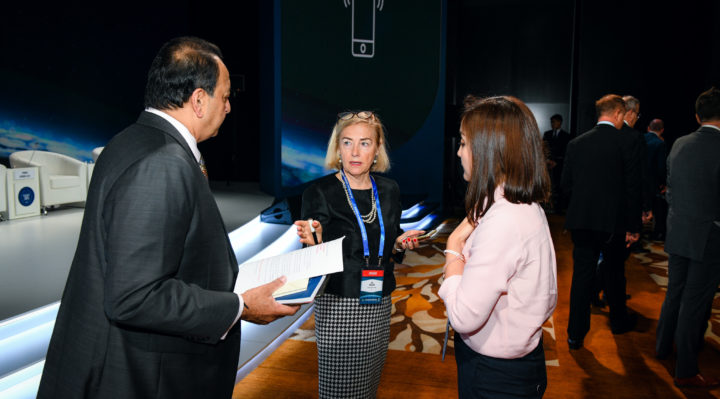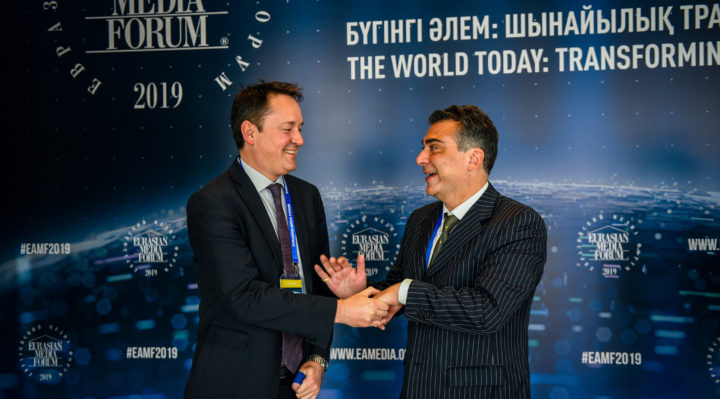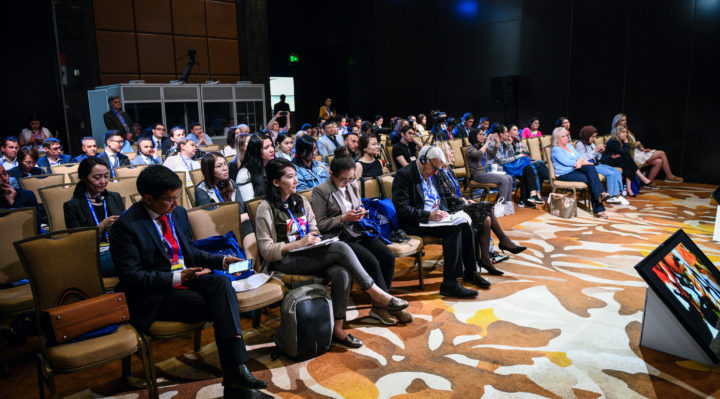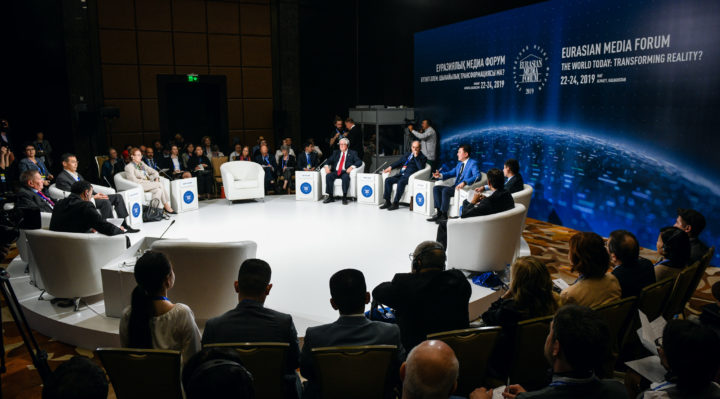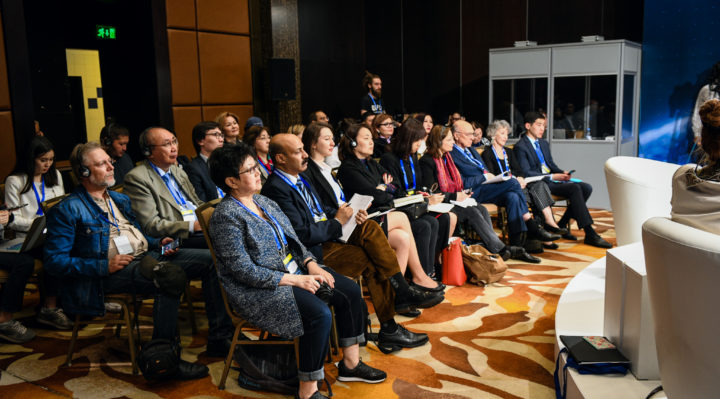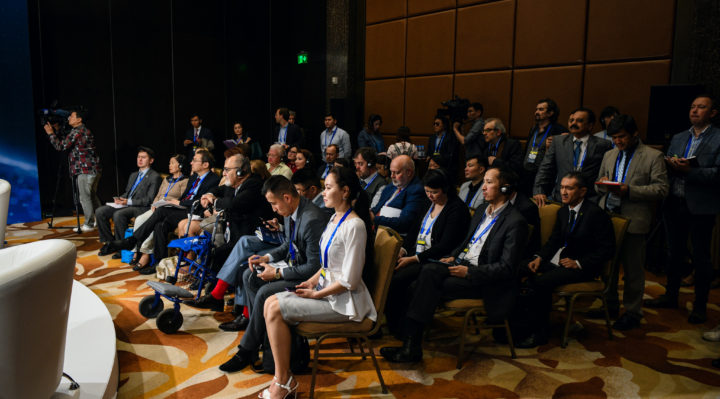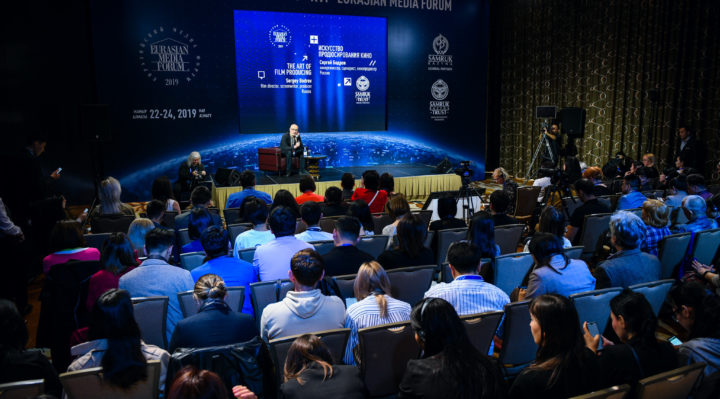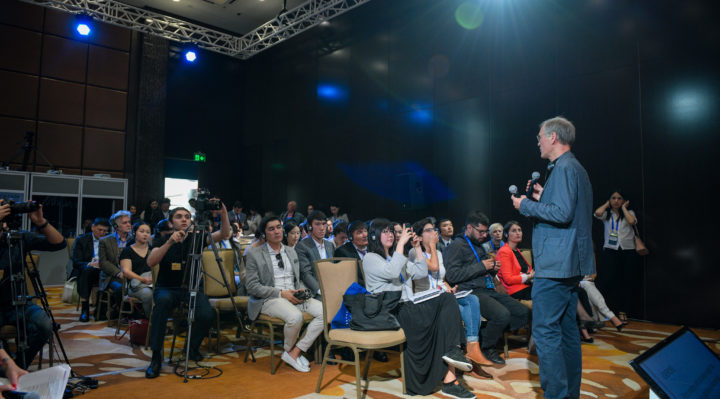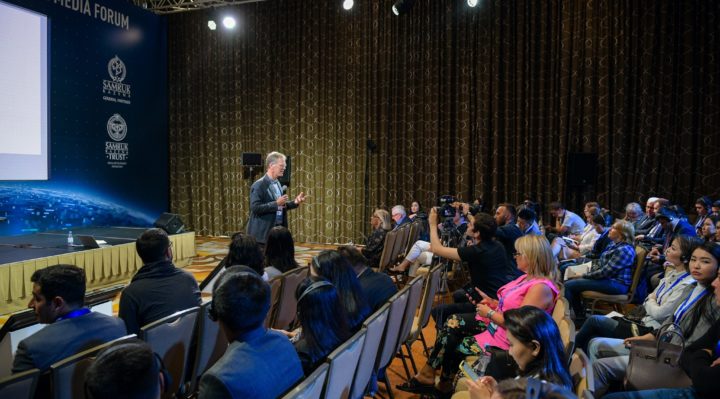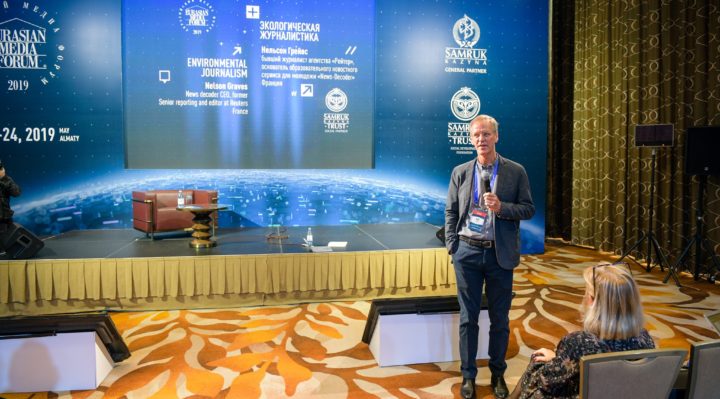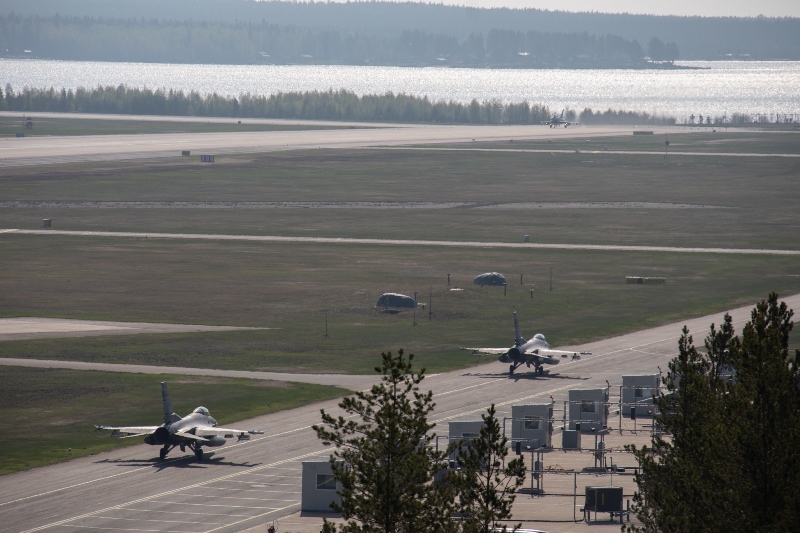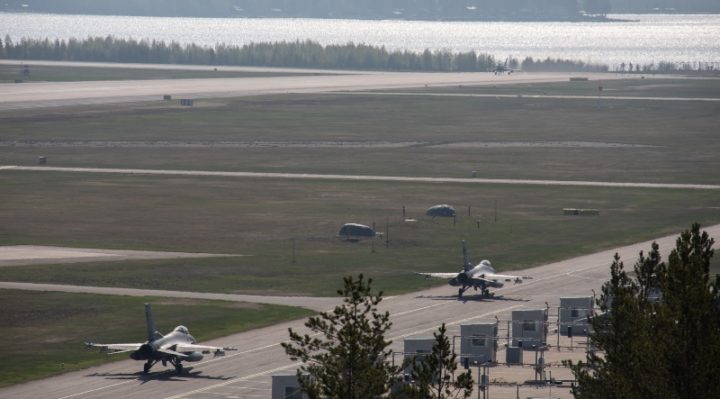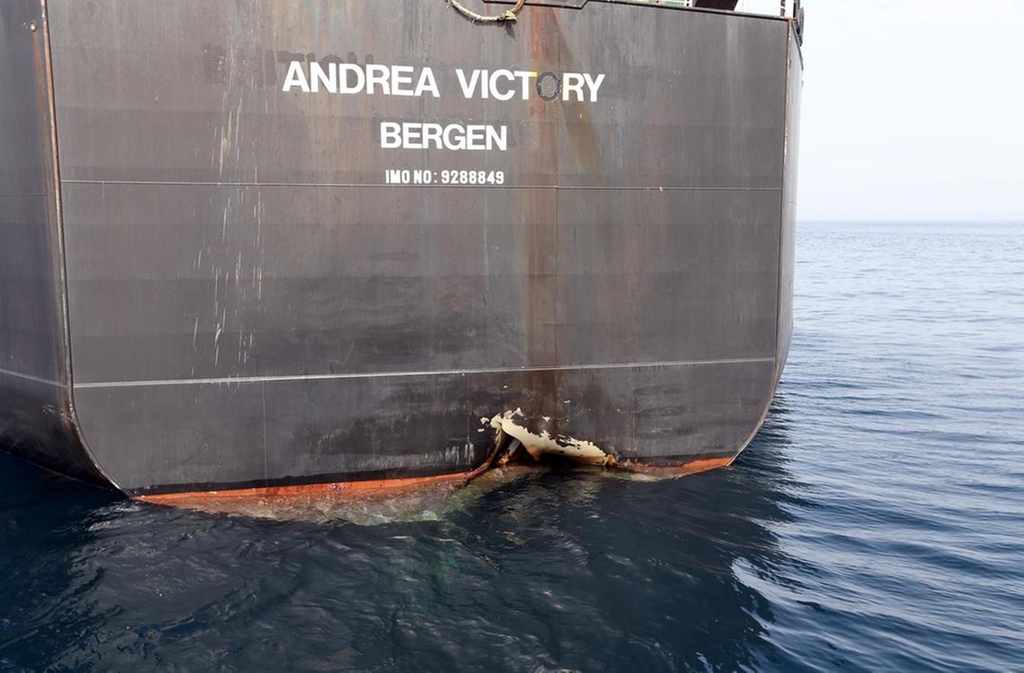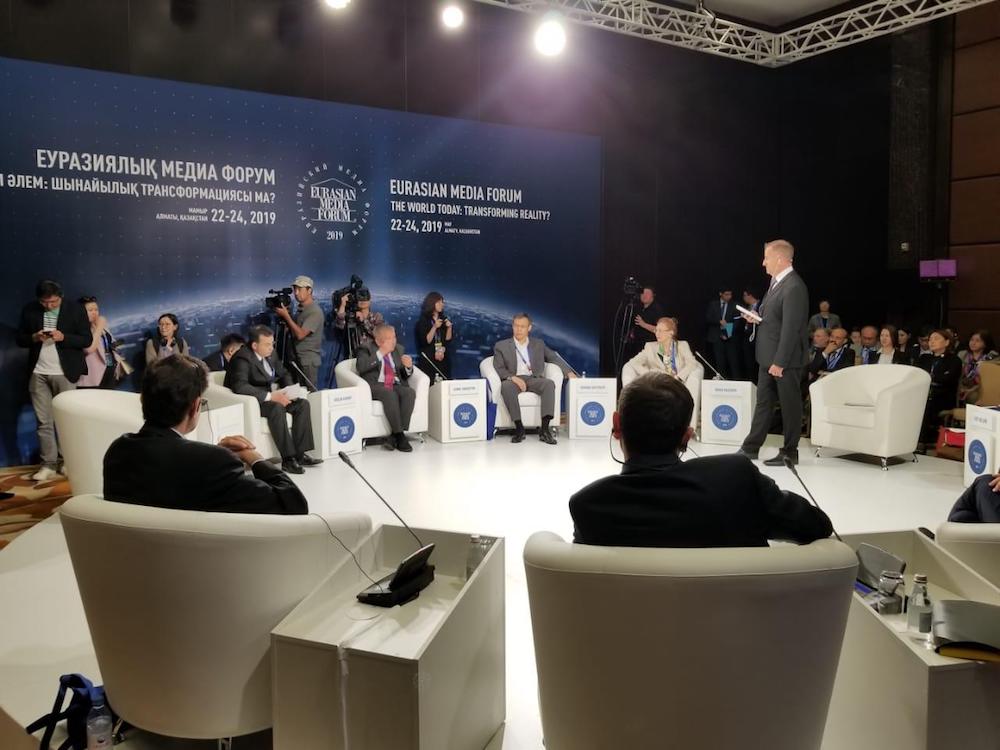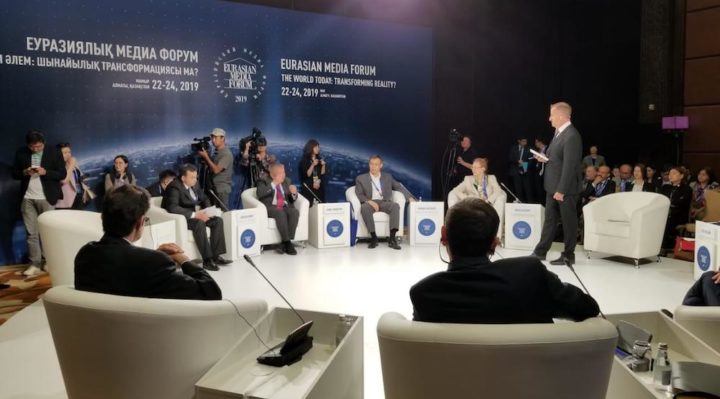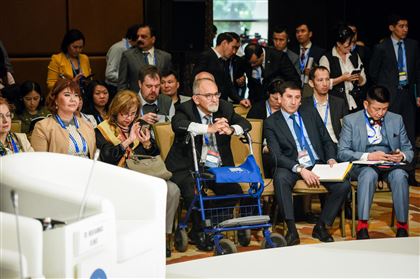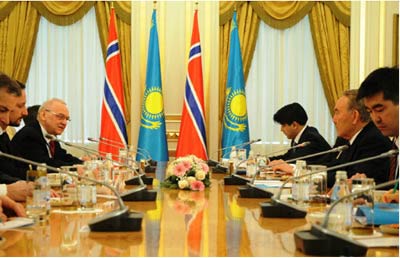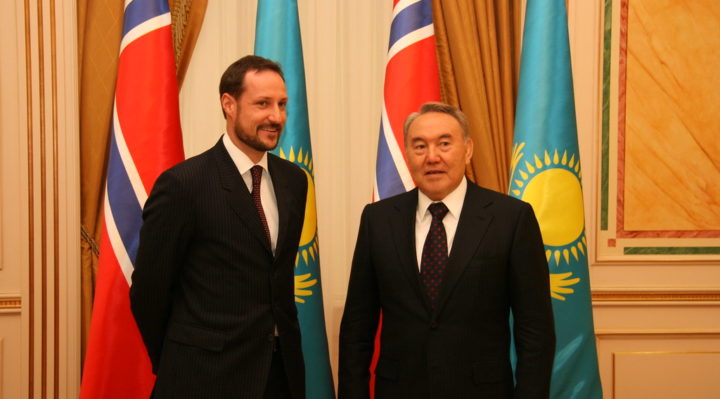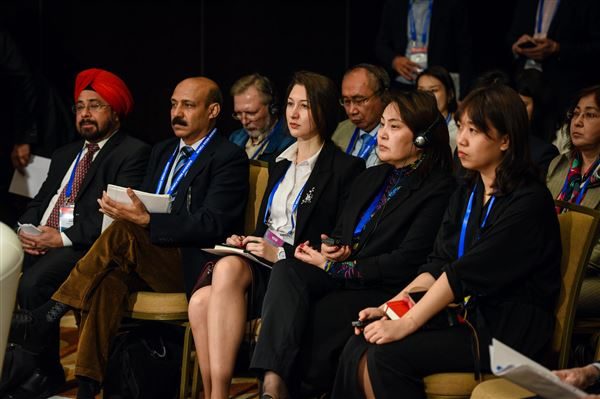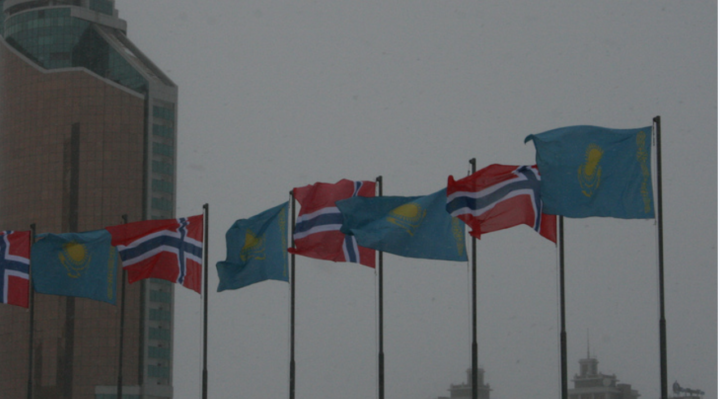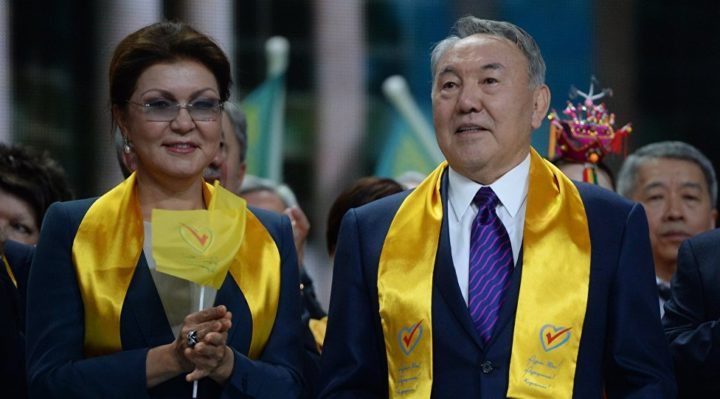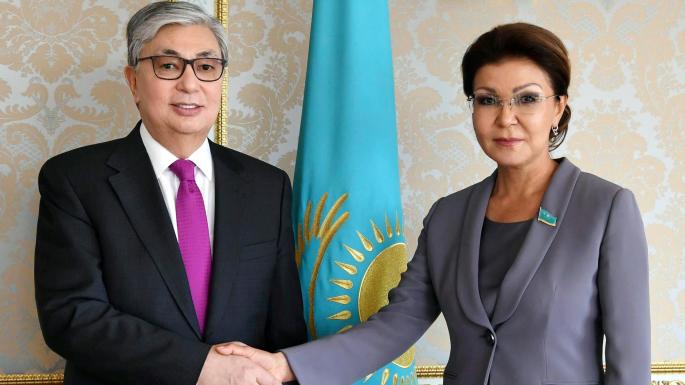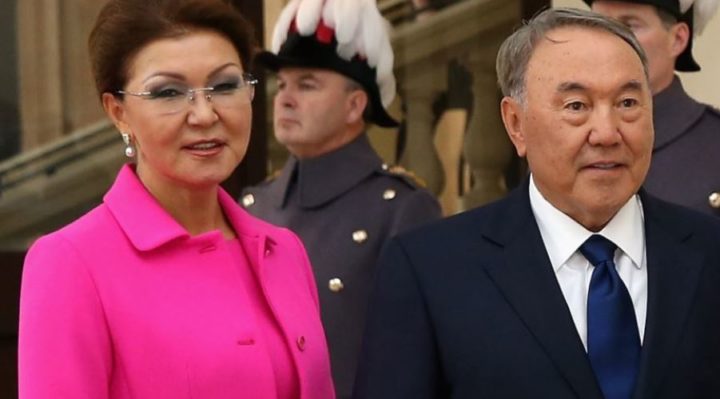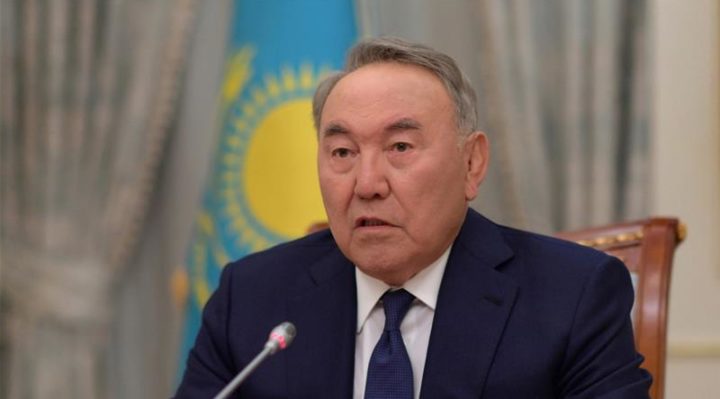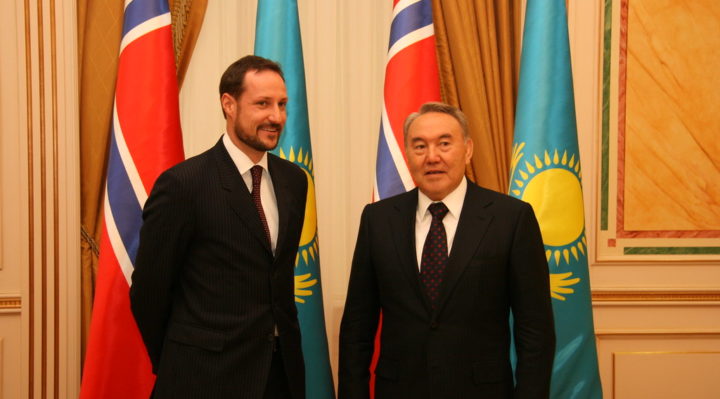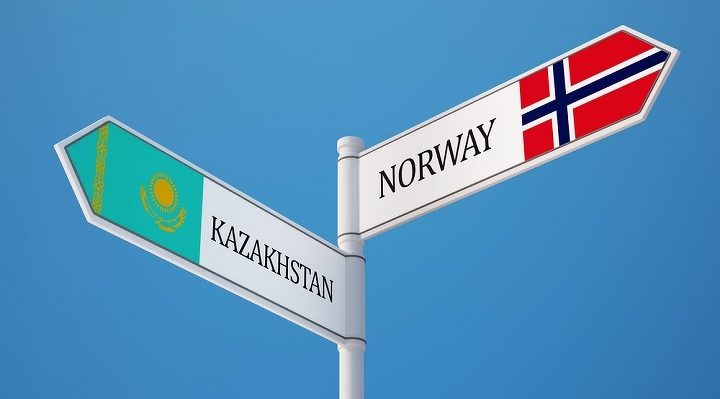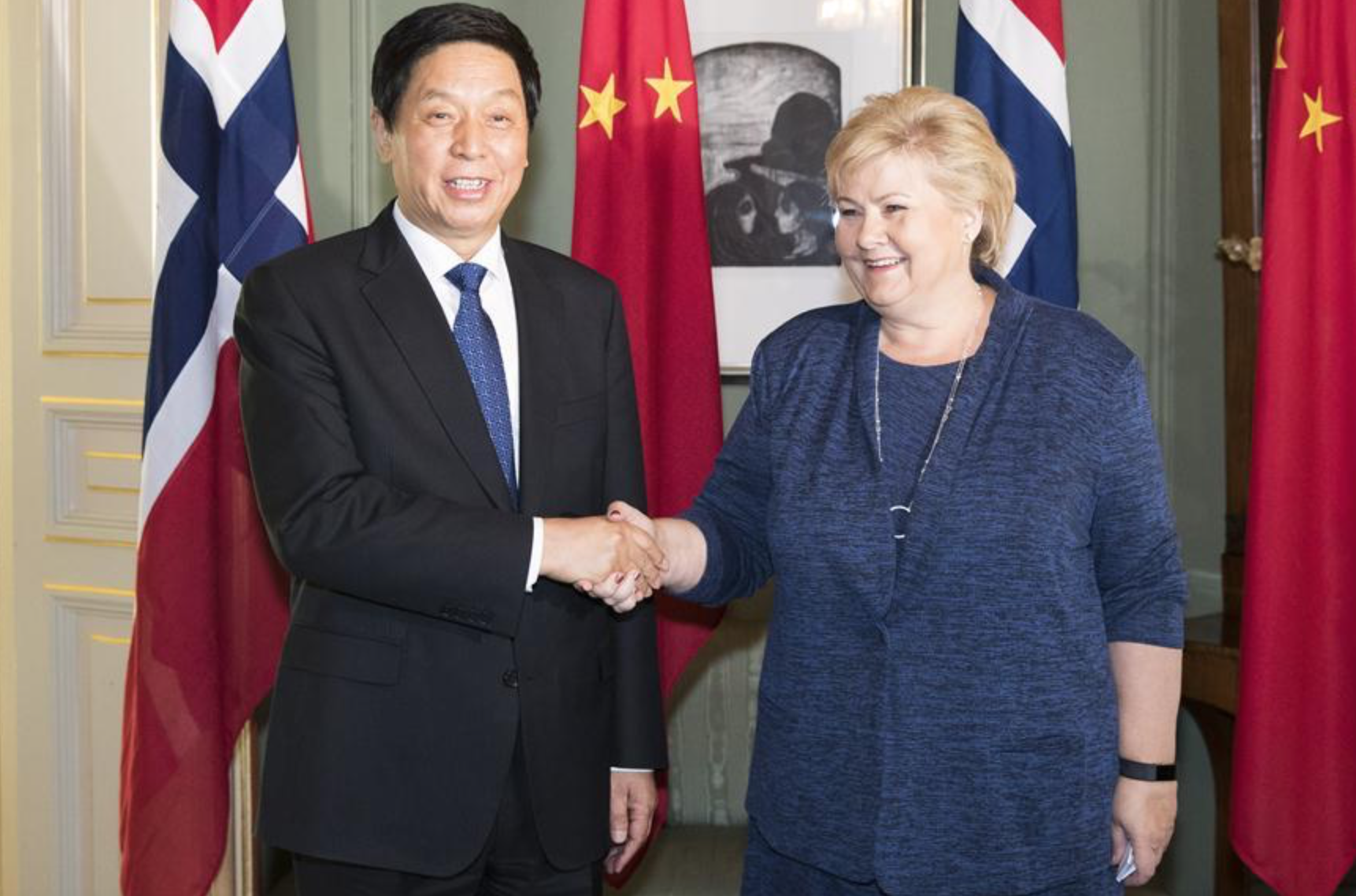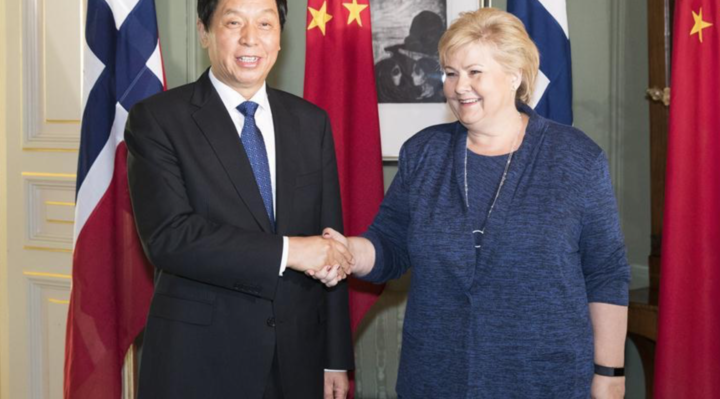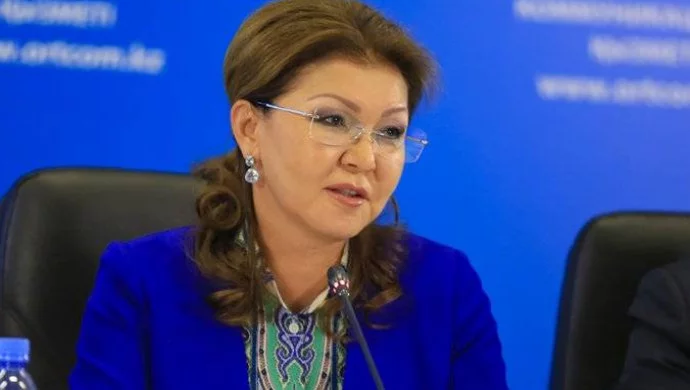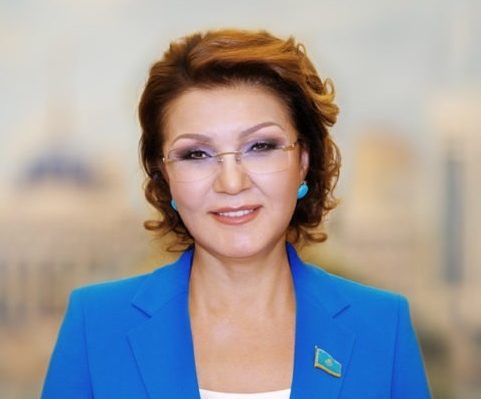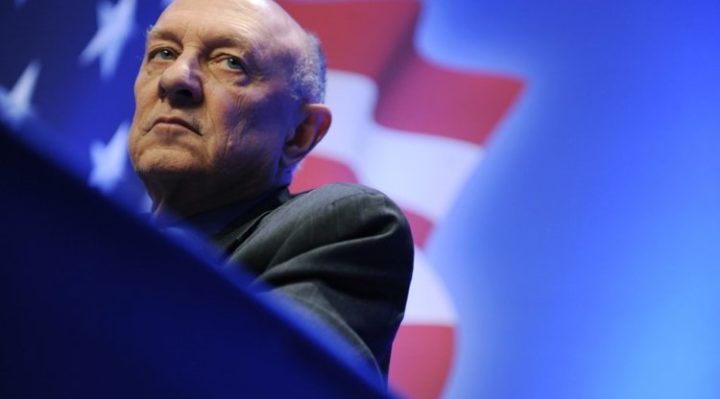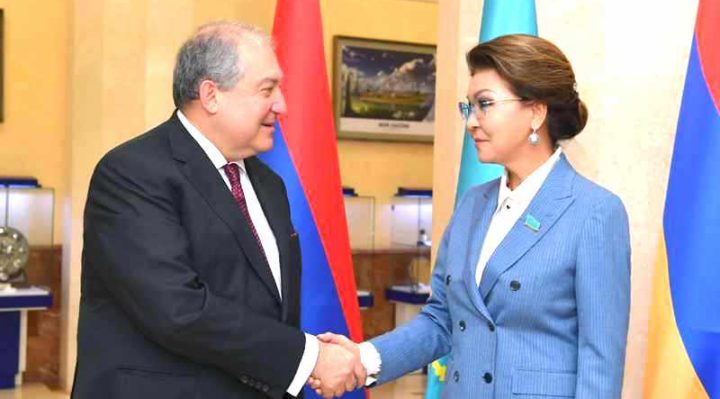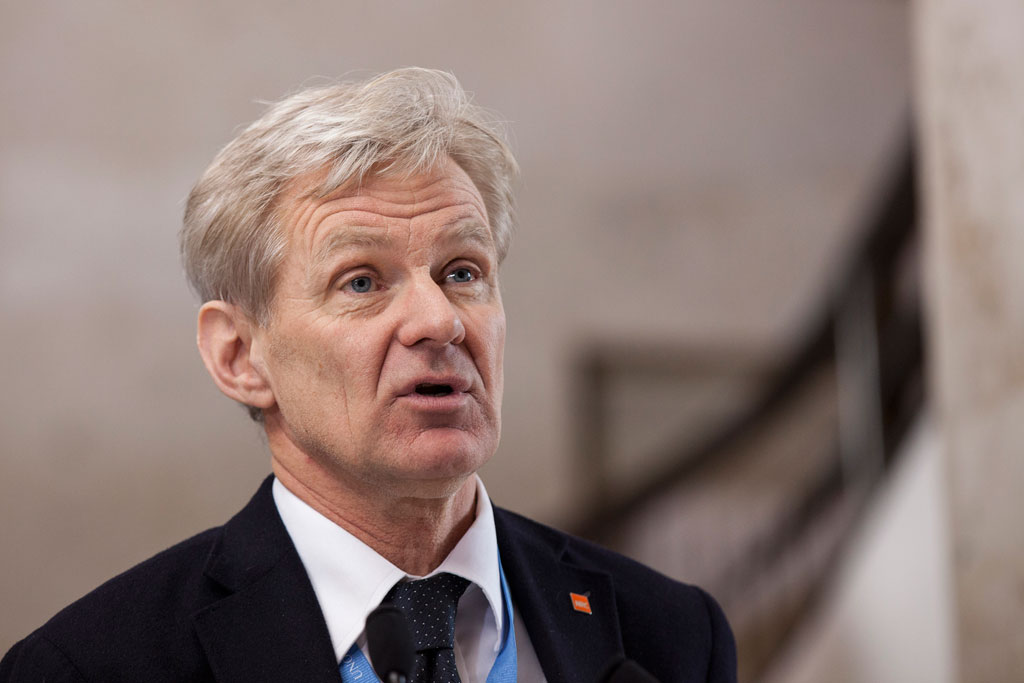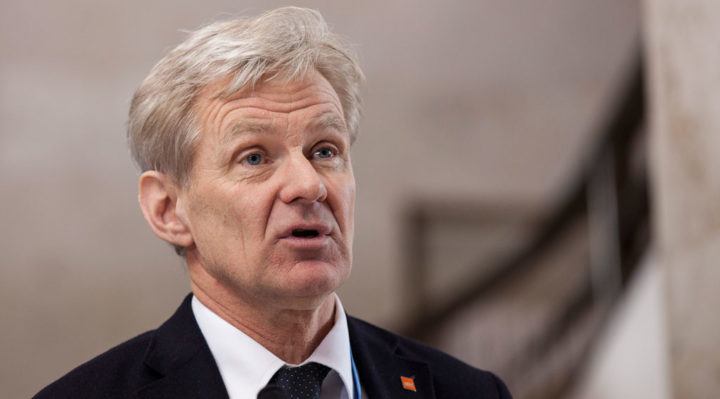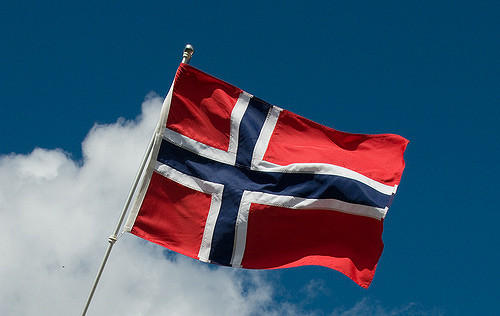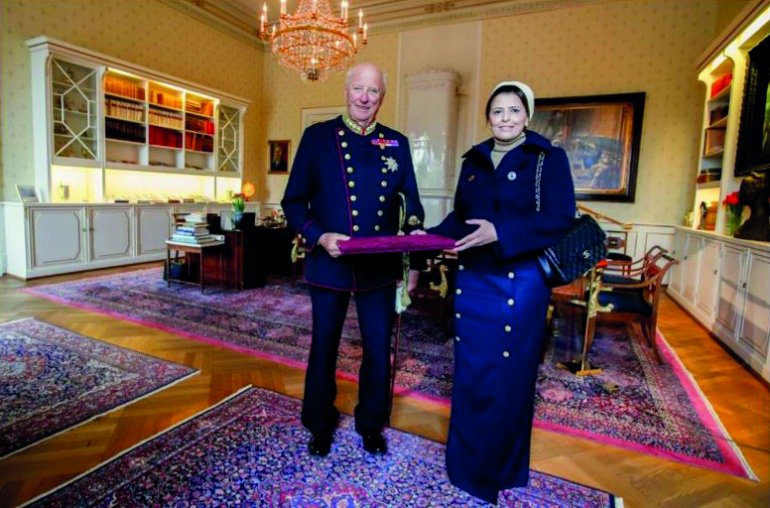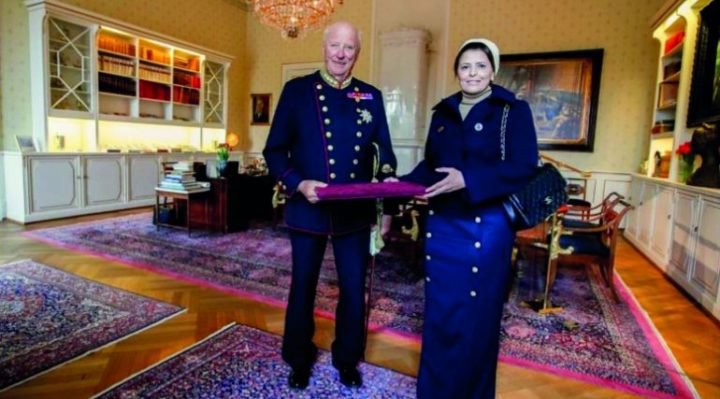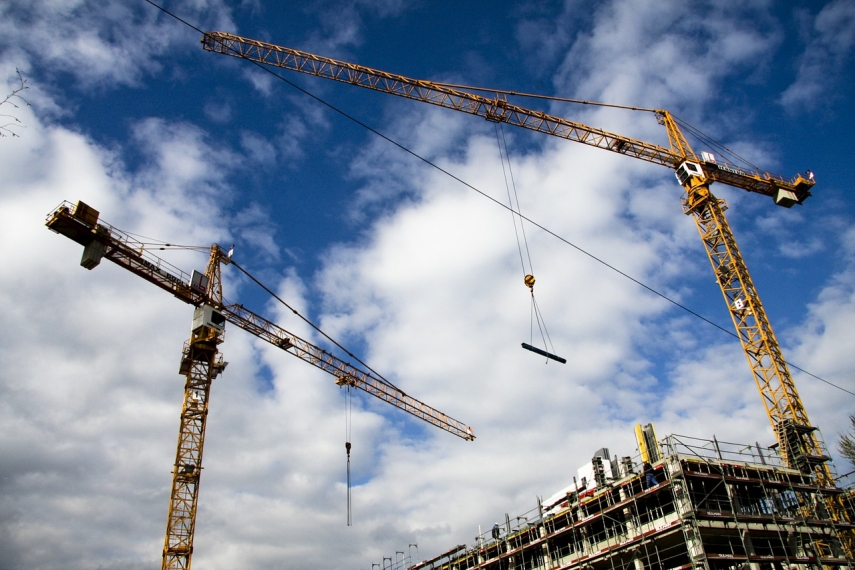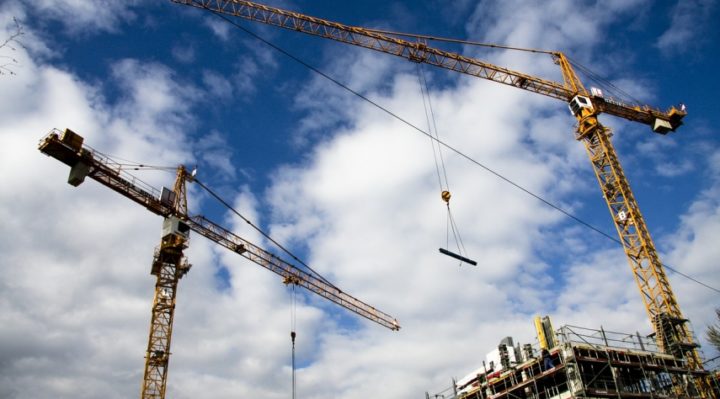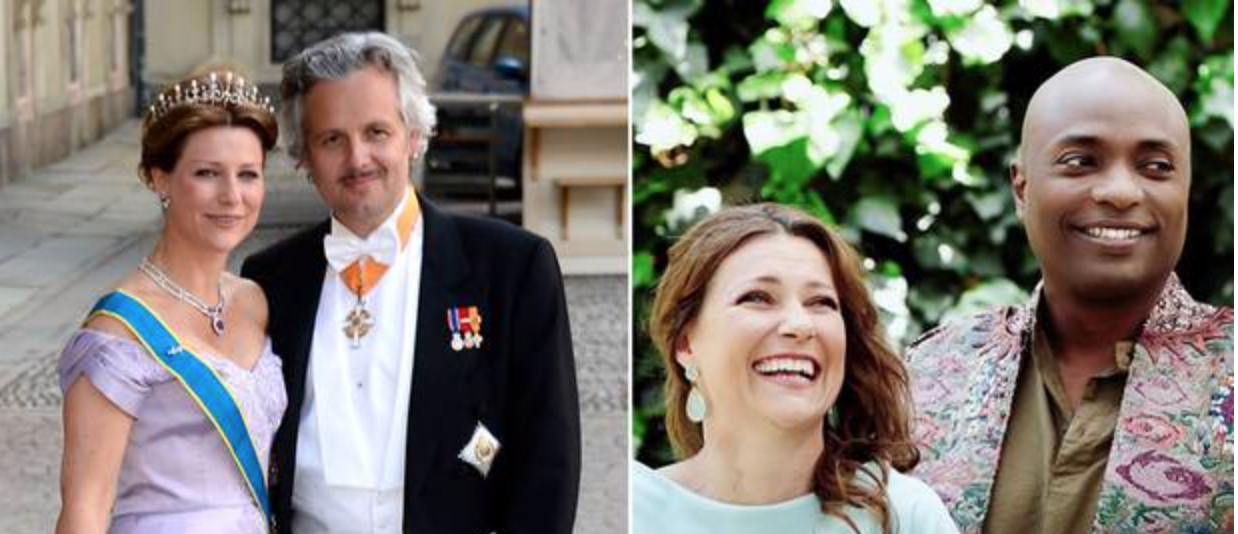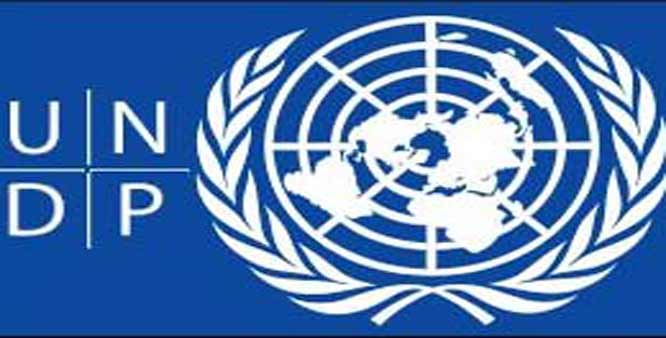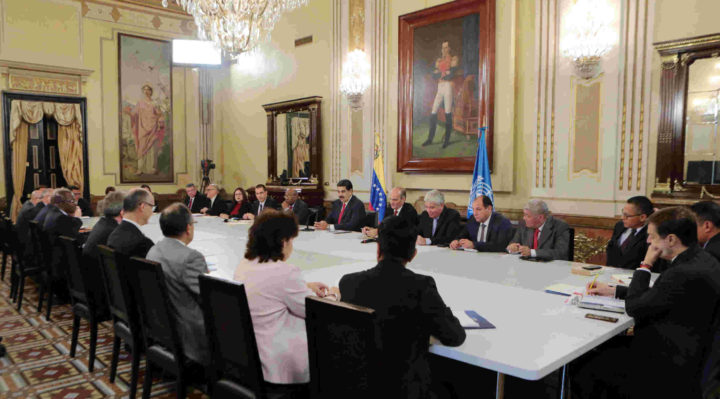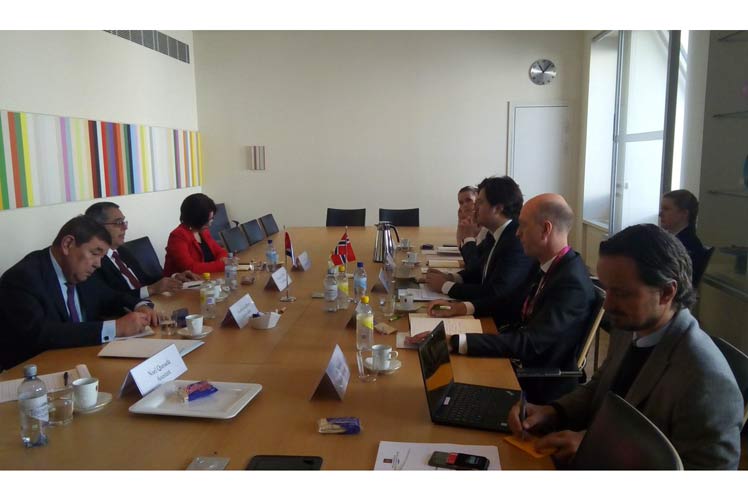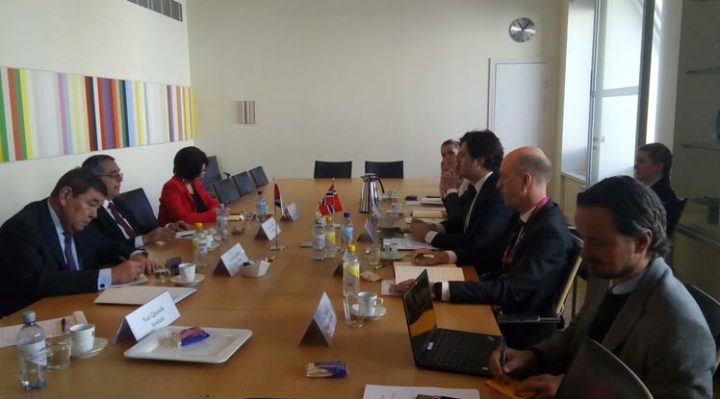Eurasian Media Forum conference this week sought to define “Democracy in Central Asia” and to find ways to confront its consequences — in policy-making decisions, social perceptions, focused on confronting anti-Semitism and cultural interactions. The theme of the 16th Eurasian Media Forum is “The World Today: Transforming Reality?”
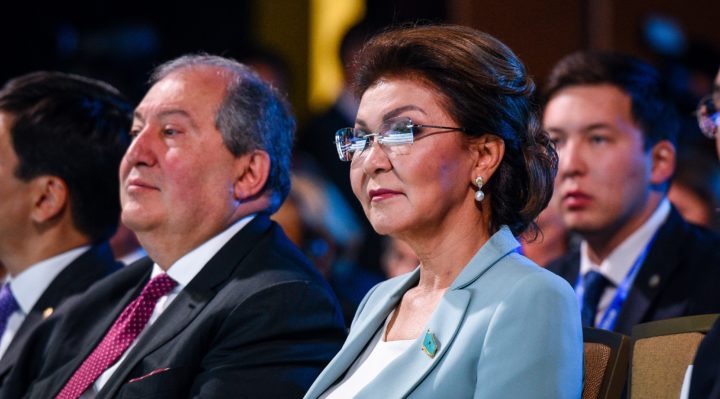
Within the framework of the Eurasian Media Forum in Almaty, Kazakhstan, Armenian Prime Minister’s wife Anna Hakobyan responded to an Azerbaijani reporter’s query about the Nagorno-Karabakh (Artsakh) conflict, and she stressed that her message as a mother and a woman is that this conflict should be settled through negotiations, rather than through war.
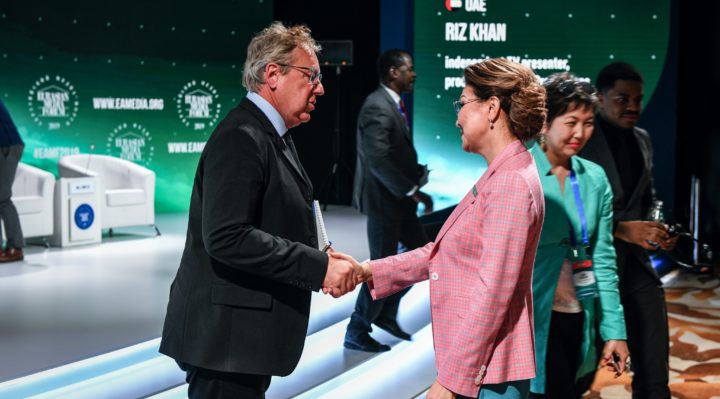
“The strongest stories combine dry data and a human approach. This allows you to see the whole picture of our reality. It is necessary to find a human example and show how this or that environmental situation has affected specific people,” , administrator and founder of the News-Decoder news service for young people and former Reuters’ journalist Nelson Graves said. “Young people are most aware of environmental issues and are involved in finding solutions. After all, climate change will affect the younger generation the most, and they are aware of this,” said Nelson.
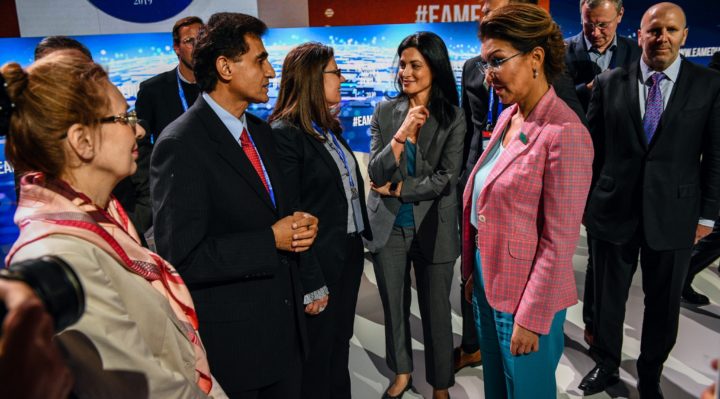
Contrast VR company (part of Al-Jazeera TV channel) Head Zahra Rasool spoke about using VR in storytelling. She creates 360-degree videos using VR and augmented reality (AR) technologies. Zahra showed one of her works and let participants try a VR-headset. The use of VR or AR technologies in video production is not always necessary, she said.
“Use these technologies if the story requires it,” said Rasool. “Will the story really get better, more alive, if it is presented in a 360-degree video?”
The story in VR usually is narrated from first person perspective, thus, it requires bright characters and as it is 360-degree videos it needs action, said the speaker. The technologies used reporting gives an opportunity to give voice to main characters of the story.
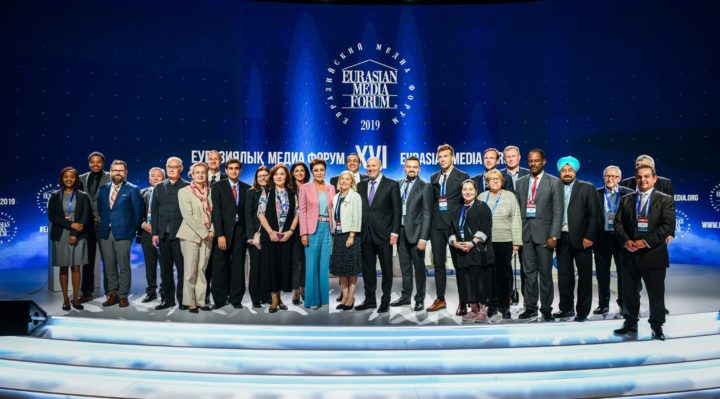
The next speaker, British journalist Jenny Kleeman spoke about freelance writing. Kleeman addressed questions concerning how to present one’s idea, how to sell oneself as a professional, how to make a living and how to protect oneself.
“Freelance journalism is an interesting way to make a living, but you will not be rich. (You’ll obtain) experience and emotions, yes,” she said.
She stressed freelance journalists must unconditionally believe in oneself and never give up one’s ideas.
“Now, I am working on ideas that I once put aside five-seven years ago,” said Kleeman. “Even if your idea was rejected, your efforts were not wasted. Your efforts were wasted if you surrendered.”
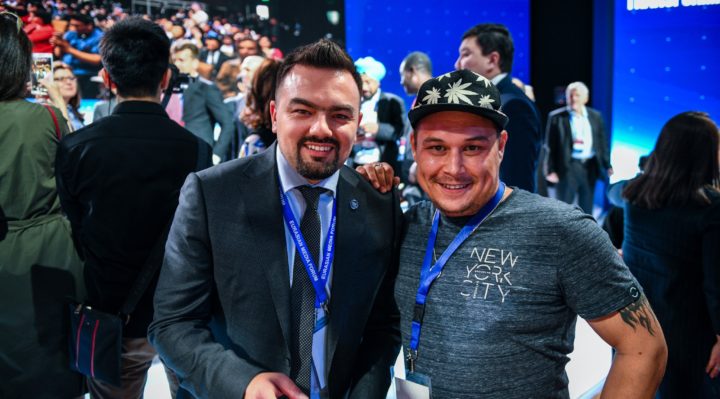
TASS Russian news agency’s photo editorial staff head Grigoriy Dukor (Russia) spoke on photojournalism illustrating how a single photo can tell a story using his own works as examples. He said this is the main idea of photography in general.
For photojournalists, it is necessary to search and wait for the perfect moment and be attentive to details. Good shots cannot be made by an accident, he said.
“The photographer must clearly know what he will shoot before shooting,” said Dukor.
Ivo Burum, a media discipline teacher from Australia, columnist, producer, trainer on mobile journalism master classes for journalists and media community representatives, demonstrated the creation of a video report in real time, using his mobile phone.
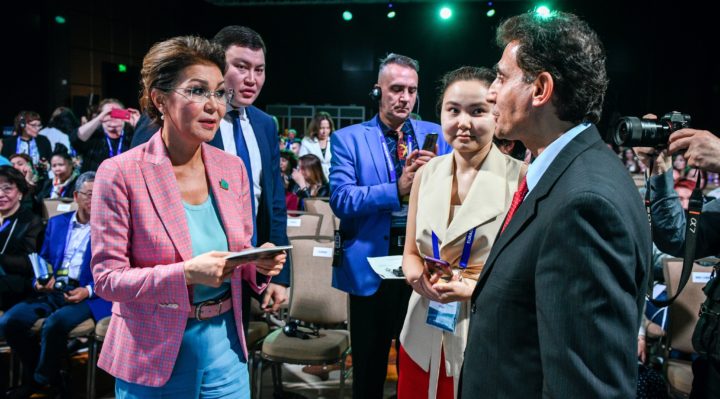
The main distinctive characteristics of mobile journalism are accessibility and instantaneousness. It is easy to learn using a mobile phone and it is relatively cheap and small, he said.
Steve Bannon and George Galloway reportedly hugged each other in Kazakhstan following Theresa May’s resignation as prime minister. The pair were in the Kazakh city of Almaty to take part in a televised debate at the 2019 Eurasian Media Forum.
Natalia Antelava, a journalist in attendance who posted the photo, claimed Mr Galloway announced, “Theresa May has resigned”, to which Mr Bannon replied, “Let me give you a hug”.
Ms Antelava tweeted: “I pulled a camera out just as they let go of tight embrace but here is the far right and far left very much on the same page in Almaty.”
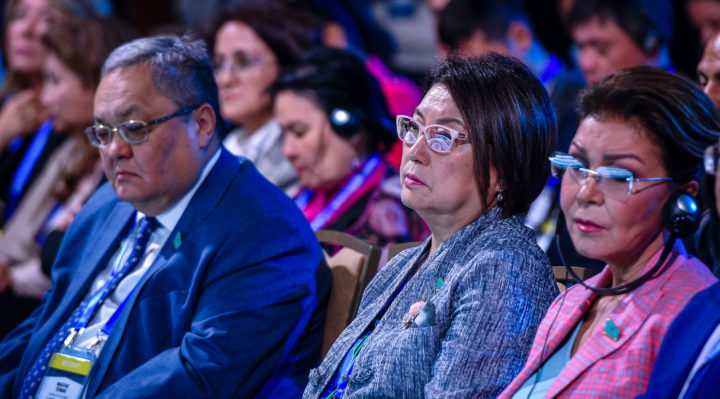
Mr Galloway later defended his interaction with Mr Bannon after journalist George Monbiot asked on Twitter if the man in the picture was really him.
“What do you want me to do after a televised debate – punch him?” Mr Galloway said. He later suggested he had never hugged Mr Bannon, tweeting, “You see me hugging anyone Georgie Boy?”
Indian Ambassador to Kazakhstan Prabhat Kumar, who finds Central Asia to be India’s extended neighbourhood, considers the region to be a very important one for his country strategically, economically and politically. The two nations, with many similarities in culture and traditions, have had a number of exchanges in the past and now have an opportunity to further develop relations. “India and Kazakhstan have interacted for a long time. The relations are more than 2,000 years old. In the ancient times, we had many people going from this part of the world to India, especially the Sakas and the Kushans. They went to India and established kingdoms,” said Kumar in an exclusive interview with The Astana Times.
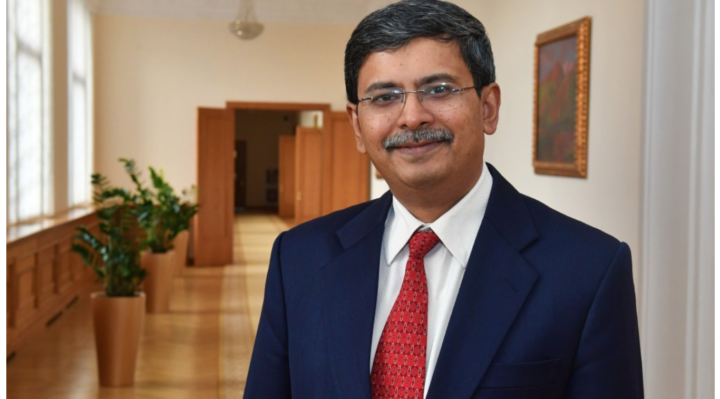
The Eurasian Media Forum also provides a chance for Kazakhstan to communicate with the world, and a platform for countries to better understand each other. “We are interested to hear the opinions of people from different parts of the world on acute global issues,” said Dr.Dariga Nazarbayeva, chairperson of the Eurasian Media Forum Organizing Committee, at the beginning of the 16th forum’s conference guide.
“We hope to bring together irreconcilable positions in an open dialogue, to promote mutual understanding and tolerance, to help unite efforts to solve common problems,” Nazarbayeva said.
The Samruk Kazyna Sovereign Wealth Fund is the main partner of the forum. The Samruk Kazyna Trust Social Project Development Fund assisted in organising master classes.
The forum, founded in 2002, annually unites more than 500 delegates from 60 countries. Its mission is to create conditions for a free and open dialogue among politicians, journalists and experts on key issues of Kazakhstan’s geopolitical, economic and socio-cultural development, Eurasia and the international community.
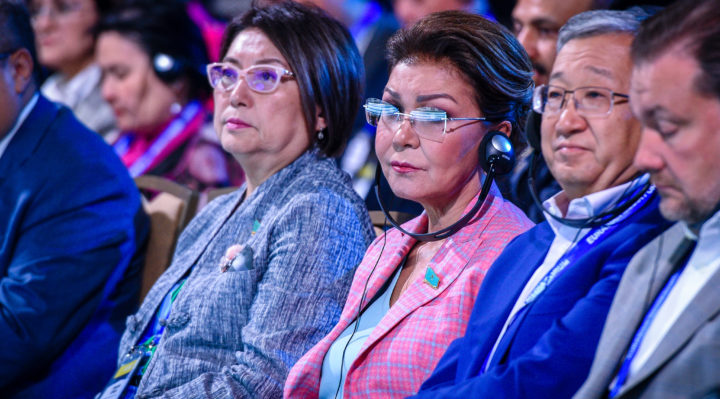
SESSION NO. 1 [DE]-GLOBALIZATION: THE WORLD IN SEARCH OF NEW DEVELOPMENT MODELS
In its first session, the Forum launched into a high-level discussion on whether, after years of globalization, the world was headed for a reverse process of ‘de-globalization’. The six panellists generally rejected the suggestion, predicting instead a kind of ‘new globalization’.
Moderator Ghida Fakhry, Presenter TRT World/Moderator Doha Debates, introduced the debate by sketching a picture of «an increasingly fractured and chaotic world that feels more dangerous even than in the time of the Cold War.» Given a reported backlash against globalization, was de-globalization the answer? she asked the panellists.
President Armen Sarkissian of Armenia, speaking first, said he did not believe in the concept of de-globalization. Despite concerns about trade wars and rising populism, globalization was not over. If anything it would continue at a faster rate.
The Armenian leader pointed out that globalization was not new. It started in a sense with Alexander the Great and the old Silk Road. He was proud to say that Armenians all over Eurasia had played a big part in the process in the past and would continue to do so.
«In the new world everybody is connected through digital systems. This is why globalization will continue to grow. The fact that we don’t know how to manage it is another question,» he said.
Asked by the Moderator about Armenia’s relations with Russia, given its closer contacts with the European Union, Dr Sarkissian said his country was a crossroads, a small state but a global nation. «We know how to work with other nations, our friends.»
Armenia had very good relations with Russia and Eurasia and saw no contradiction in having an agreement wiuth the European Union. «Use Armenia as a bridge,» he declared.
Dr Baige Zhao, Vice Chairwoman of the Foreign Affairs Commission of China’s National People’s Congress, said she preferred to call the current state of development in international relations ‘new globalization’ rather than ‘de-globalization.’ Technology was changing the world very fast, with huge opportunities for growth. Developing countries had had no access to information just a few years ago but now they had the tools for independent development.
The new challenge was to develop principles for this new international society, establishing a basis for spiritual value.
Toomas Hendrik Ilves, former President of Estonia, said there was no single answer to the question of whether globalization had stalled. Since the appearance of the Smartphone in 2006/7 there had been an incredible explosion of access to the internet, now reaching four billion people. «That reduces the chance of de-globalization,» he said.
On the other hand, new technology promotes disruption and can lead to a new kind of assymetric warfare. Together with populist politicians, robotisation and artificial intelligence, there could be a risk of damage to industralisation and global trade, he warned.
Tatyana Valovaya, Minister in charge of Development and Macroeconomics, the Eurasian Economic Comission (EEC), said she did not believe in deglobalization any more than in a crisis of civilizations. «We never had real globalization. We have global markets, global companies, global media, but no global government,» she argued.
There was a reaction against the old form of globalization but attempts to fight real globalization would fail. «I foresee a difficult but positive road to new globalisation,» she said.
A good example was the growing partnership within Greater Eurasia and the re-commecting of Asia and Europe through China’s Belt and Road initiative and other developments, she said.
Ghida Fakhry then asked Sir Ivan Rogers, the United Kingdom’s former Permanent Representative to the Europen Union (EU), to comment in the context of de-globalization on Britain’s referendum decision to leave the European communiy.
Sir Ivan said this was a genuinely difficult situation because the EU was the deepest union of countries on the planet. No developed country had ever taken such a decision and the British authorities were struggling with the technical complexity.
The referebndum reslt had been a consequence of the financial crisis. Ordinary people had become out of tune with the political elite. A lot of discontent had built up particularly about social inequality, which poorer people tended to blame on globalization. Those wanting to leave the EU had a powerful slogan – ‘Take Back Control’ – but there was no agreement about where they wanted to go, with great arguments begtween proponents of globalization and de-globalization.
Asked about the prospects for a second referendum, Sir Ivan said: «I am not sure it would be useful in the currently bitterly divided political environment, which is more brutal and conflictual than I have ever seen it,» he said.
Yerzhan Ashikbayev,Kazakhstan’s Deputy Minister of Foreign Affairs, said that Kazakhstan, as the biggest landlocked country in world, was not well placed to play an active part in de-globalization. On the contrary, his country had faced a huge challenge after the break-up of the Soviet Union and had had to reach out to the outside world.
This was not not just about infrastructure, but even extended to introducing English as a third langauge. «This is a testament to our anbition to be part of global development.» he said.
Asked about Kazakhstan’s ability to retain a reputation for stability, he said that the presidential elections scheduled for June 9 wold give gurantees of predictability for foreign investors. Compared with the threat of protectionist trends in the world, Kazakhstan was a model of a harmonious society, he said.
«Kazakhstan favours dialogue of integration, which is only possible with trust and confidence, not fear and suspicion.»
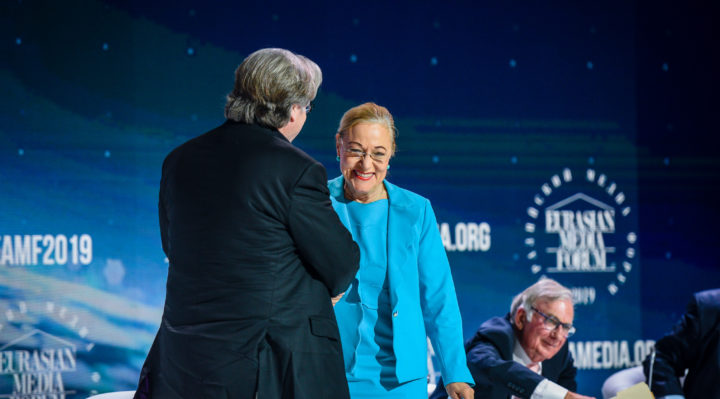
SESSION NO.2 CONSUMPTION CRISIS
Conference host Riz Khan introduced this session by telling the audience that the rich were getting richer, the poor poorer – “meanwhile the developing world increases its demand for food, energy and water threatening to strip our planet or possibly destroy it.”
Jazmin Acuna, Editor of El Surtidor Paraguay and winner of this year’s Planet Prize for Global Youth and News Media, said powerful players were involved in the world’s food crisis and their economic interests were putting people at risk and into poverty. “Our role as journalists is to let the public know who those people are.”
She explained that she had been campaigning in the Chacos region of Paraguay which has the highest rate of deforestation in the world. European meat consumers were accelerating that deforestation. Big landowners were clearing forest to put more cattle to pasture or grow soya beans for export to China for example. El Surtidor had been campaigning hard to reverse this, but “while it has never been so easy to launch a new media site, it has never been so hard to catch people’s attention, but we have to make an extra effort to draw attention to these issues.”
Steve Finn, Vice President of Food Waste Prevention for Leanpath, USA said we still had to face the global challenge of feeding 10 billion people by 2050.
“800 million of them are already going hungry but we need to feed another 2 billion people in 20 years.”
People in the developed world expected food to be available 24/7 and relatively inexpensive so there was inevitably a lot of waste.
“We have lost touch with the value of our food and what it takes to produce it. In the US we waste 30-40% of our food and globally the figure is 50%. These levels are not sustainable.
Basant Rathore, Senior Vice President of Strategy and Brand at Prakashan Ltd., India, said crisis should really be regarded as a natural part of progress. We have to be willing to fight and push back and the media had a significant role to play in publicising the problems and helping to solve these crises.
Moderator Todd Baer, Global Director at Blomberg, UK asked Ambassador R .James Woolsey, a former Head of the CIA and energy conservation expert, if the crisis included energy consumption.
Ambassador Woolsey replied that in the US there was a completely different problem from 10-15 years ago because the development of fracking in West Texas meant it was possible to produce natural gas in a relatively clean and effective way. It was also possible to search the deep ocean where there had been plant life hundreds of millions of years ago, drill and produce oil and gas from it.
Natural gas was so abundant that for a while the people that produced it recently decided it was cheaper to give it away free – but only for a month or so. An even greater help for green energy in the future was solar power because of the development of new batteries and solar cells. The distribution of solar power and natural gas around the world had made the situation look much better than it had a few years ago.
Returning to food overproduction, Steven Finn said air travel was a good example of the problem.
“You are always being offered food. It is always there. We also expect tremendous variety which leads to a lot of stocking and a lot of waste. It is a developed world problem, critically an American problem but also in the United Kingdom and other developed countries.”
The richer classes in developing countries were also beginning to copy the western diet wanting meat, protein and other items.
The FAO (Food and Agriculture Organisation) was pushing for a 20% reduction in food waste by 2030. “We have a lot of work to do.
Basant Rathore mentioned one of the ways his company had managed to help in India.
“There is a custom in India to give any guest a full glass of water although people usually do not drink half.”
They went round every restaurant in the city and asked them only to provide half a glass for 30 days. They then put the same message around students asking them to give guests only half a glass of water for 30 days.
“At the end of the month millions of litres of water had been saved.”
Jorge Fonseca, Coordinator of the FAO UN Food System Strategic Programme in the USA, said that food consumption was part of the culture. In Saudi Arabia where he had worked he noticed that restaurants always gave guests 700 grams of rice with their main dish. He asked if it could be reduced but was told that people expected it, there would be complaints and they would lose business if they did not get it. Such measures had to be organised collectively.
Returning to energy Ambassador Woolsey said he had written a paper about making oil like salt.
Before refrigeration salt had been a precious commodity – the only way to preserve meat. Roman soldiers were paid in salt, the word salary was derived from salt. It was only with the advent of electricity and thus refrigeration in the 1890s that it began to lose its value.
“Today everyone has a fridge and salt has almost no value. What we have come to realise is that the value of a substance can change radically, that technology can make a product redundant. We can make it possible for people to treat oil like they treat salt.”
Turning to the food consumption crisis, Ambassador Woolsey said you only had to walk down a street in the United States to see there was an obesity crisis with too much food and too much sweet food being consumed, with the resultant increases in diabetes and heart disease that had been mentioned.
“We have a problem of the first order. We are talking about major diseases in my country and the western world as a whole.”
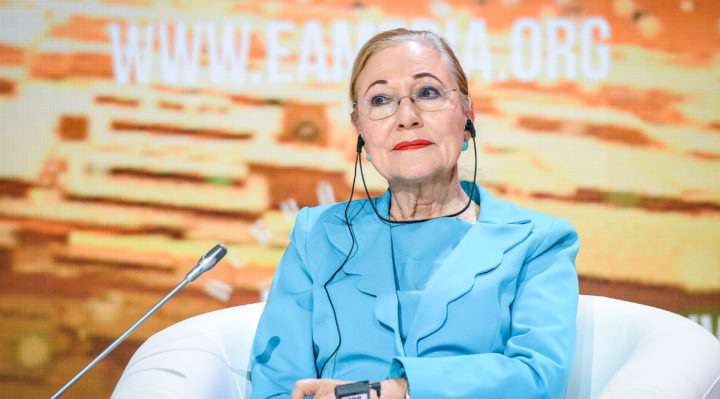
AWARD CEREMONY FOR THE WINNERS OF THE PLANET PRIZE
CONFERENCE HOST Riz Khan introduced the first award ceremony for the winners of the Planet Prize, saying there was no greater pressure today than doing something about saving our planet.
Editor Jazmin Acuna and Director Alejandro Valdez of El Surtidor, Paraguay accepted The Planet Award for saving a rain forest in Paraguay. Dr. Aralynne McMane a Director of News Decoder and fellow board member Jo Weir, who created the global prize, presented it to the pair.
The digital news team at El Surtidor used a 4-part series to tell the story of the Gran Chacos forest, which was losing a hectare of trees every minute. It deployed data-efficient, mobile content that allowed users to quickly find and distribute content by swiping their smartphones.
The sizable young audience that tapped into the colourful series persuaded Paraguay’s new president to take steps to halt the deforestation.
The judging panel which included the Chair of the Kazakh Senate and Eurasia Media Forum creator Dariga Nazerbayeva, called the entry “Impactful, innovative and inspiring.”
A newspaper in India, Dainik Jagran, took second prize for organizing a silent protest, featuring demonstrators wearing black face masks with drawings of yellow smiles, that convinced authorities to take quick steps to improve air quality in the northern city of Lucknow, one of the South Asian nation’s most polluted cities. Basant Rathore, Senior Vice President for Strategy for Dainak Jagran, accepted the prize
Copenhagen-based Young Reporters for the Environment won third prize for empowering young people around the world to investigate and report on critical environmental issues through different media channels.
The awards marked the second edition of the Global Youth & News Media Prize, created last year by McMane and Weir to celebrate news media work that “serves, supports and both attracts and learns from young audiences.”
Along with News-Decoder, the Google Digital News Initiative and the European Journalism Centre supported the awards.
The next prizes are set to be announced this November at the NewsXchange news media conference in Paris. They will celebrate reporting that has an impact and strengthens media literacy. The deadline for submissions is June 25.
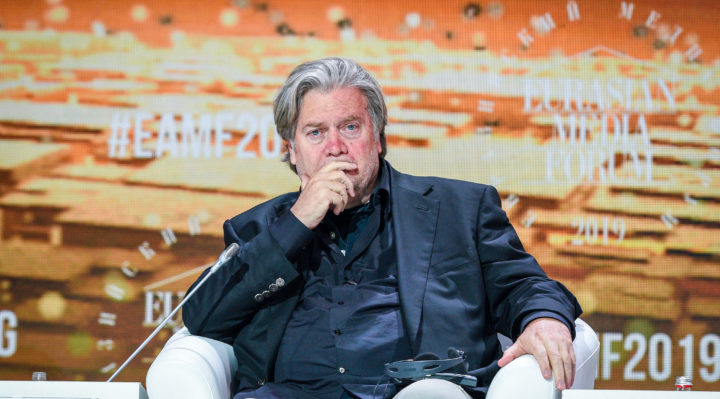
SESSION NO. 3 DIGITAL REALITY OF MASS MEDIA
The third session ran along paths already opened up during the first two sessions: globalization and consumption, journalism and social media. The consensus, after some lively exchanges, was that digital media did not pose an existential threat to ‘old’ media or to journalists, but did present some tough new challenges.
Citing the Shakespearean sub-title of the session, ‘To be or not to be?’, Moderator
Amjad Atallah, Managing Director, Doha Debates, Qatar, asked the six panellists to comment on whether new forms of digital media did in fact pose an existential threat to the traditional media.
Responding first, Dr. Zahera Harb, Senior Lecturer in International Journalism at City University, London, said she did not believe there was an existential threat, but there was certainly a challenge facing the media as an established institution.
“We are under attack, labelled by some as the enemy,” she said. “How do we work together to defend our vital interest, which is our integrity? Attempts are being made to undermine trust in the media, which we must resist.
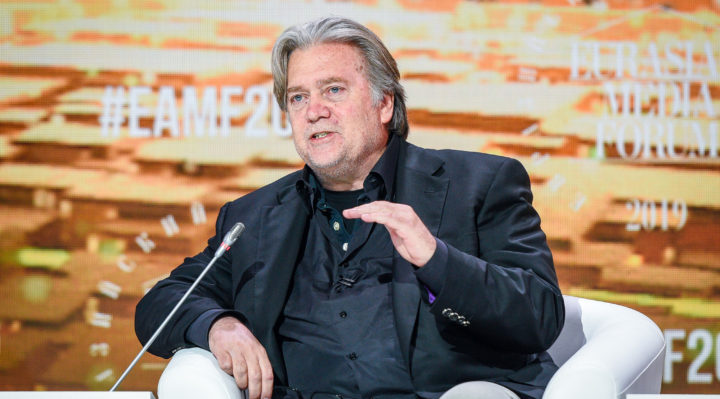
“Misinformation is the threat.”
Alexander Aksyutis, Head of Social Media, Kazakhstan, agreed that he did not see new media as an existential threat to journalism. “Social media and journalism will co-exist. Misinformation is not new. It’s nothing special. The internet enables transmission much more quickly but the problem is the same as before.”
He argued that the changes increased the value of the journalist, whose work was actually enhanced by the new technologies.
Like the first two speakers, Natalya Antelava, CEO of Coda Story, Georgia, also rejected the idea of an existential threat, but she welcomed the challenge.
“The internet gave journalism a slap that we very much deserved. Revenue models are broken, audience relations are broken and trust is broken. I think this is a very healthy process,” she declared.
The traditional revenue model had contributed to the deterioration of public trust in the media. Journalists had been forced to come down from the high ground and find ways of engaging with their audience, without becoming totally tabloid.
“This is an interesting challenge and there have been some unexpected developments along the way, for example in the United States where (President) Trump has made journalism great again in the print sector, with circulation up and revenue up. Some may not survive but that may not be a bad thing,” she declared.
Ivo Burum of La Trobe University, Australia, a former print journalist and TV broadcaster, now an academic, argued that journalists could no longer live alone. They had to talk with their audience, not just to them. “People are ready to produce their own stories. We need to develop new ways of telling stories, working with citizens, always subject to fact checking of course, that’s a given.”
Boguslaw Chrabota, Editor in Chief of Rzeczpospolita, Poland, argued that the media had always been in a state of constant change, but not journalism itself. Traditional journalists certainly faced new challenges, surrounded by an invasion of semi-journalists, maybe not all fake but not necessarily reliable.
He outlined his own experience, as a television journalist, of taking over a well-known Polish newspaper, with a mission to boost revenues. The business method had been a multi-media policy to combine print with online publishing,, with online first. “This is our success story. Our newspaper is now number one in Poland. We are still losing print circulation but the company is becoming more profitable year by year,” he said.
Mikhail Zygar, Russian journalist and writer, then took issue with most of what his fellow panellists had said. Likening them to the waiters on the Titanic, he said he was amazed that they could argue that everything was OK with the media.
“I’m shocked. There has been a colossal revolution, a psychological revolution in the audience. Everybody can be a journalist now. It’s all about content production. In the past journalists had the impression they were the only ones who could generate content. Audiences look at the world now in a new way, it’s a new generation born with mobile phones.
“Newspapers are not competing with each other but with other sources of content, individual producers, games, sport. But it’s not only fake news, cut and paste, poor quality content. These producers have amazing ideas. Conventional media are dying and we must acknowledge that.”
Natalia Antelava disagreed strongly. It was not true that traditional media outlets were dead, many of them were doing really well. Journalists had become complacent, true, but they were reacting to the new challenges. There was an appetite for reliable journalism that could revive trust in the media.
The discussion ended with general agreement on the value of professional journalists, with principles, and the survival of the best of the traditional media, but not all.
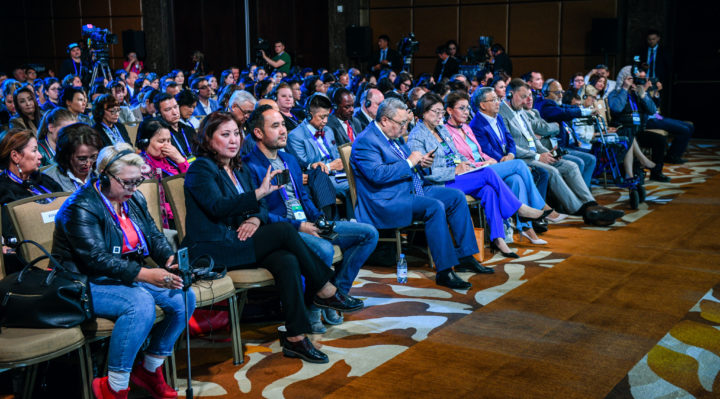
SESSION NO.4 THE AGE OF AI : THE RENAISSANCE OF HUMANITY
Moderator Ryan Chilcote introduced the debate by saying that one of the main conversations of the day was whether Artificial Intelligence (or AI) would take people’s jobs and if so which ones and what people’s reaction would be ?
Radu Magdin, International analyst and former adviser to Romanian and Moldovan Prime Ministers, said AI would not just be good by itself. “You need to plan for it.”
Society, politicians, planners and economists had got to meet to discuss all aspects and get this revolution right. “Then we will see if the age of AI will be the golden age for mankind.”
Ryan Chilcote said some people had already lost their jobs to AI and were angry though perhaps they had blamed immigration. Some would argue that was why President Trump was in power in the United States because he had tapped into that anger.
Martin Ford, Futurist and author of the best selling “Rise of the Robots: Technology and the Threat of Mass Employment,” said technology had definitely had a bigger impact on joblessness in the United States than immigration.
“These people are angry. Many are not seeing the sort of progress they expected,” but they may be blaming immigration or China because it was a lot easier to pin it on other human beings.
“As AI gathers pace it could lead to social upheaval…we need to talk about this and come up with real solutions.”
Abylaikhan Ospanov, Vice Minister of Digital Development, Defence and Aerospace, said it did not make sense to fear AI. Many people did not notice when they called a call centre that they were already interacting with AI. Whether we wanted it or not, AI was unavoidable.
Ryan asked Muthoni Wanyoike, Team Lead of Instadeep, Kenya, if she thought Africa would be worse effected than other regions by AI ?
“Yes and no,” she replied. The wealthy bodies carrying out the research were not based in Africa but at least AI research information was made available internationally unlike the past with medical research in the United States and Britain.
Martin Ford was optimistic. While most of the top level research was being done in the United States and China, Google was opening a research centre in Africa. AI was going to be available in every country in the world. “Everyone is going to have an opportunity to benefit and also to share some of the risk.”
Ryan wondered about the hostilities around AI. Only this week the United States had basically blacklisted Huawei and Google had said it would not make android available to them.
Radu said people were more relaxed about it in Europe but perhaps that was because they had a lot of catching up to do. “Technology is about dominance but also a sense of pride. Ten years ago I was in the European parliament when someone got out an i-phone, but ten years later what we are worried about with i-phones is regulations and privacy.”
Anton Mussin Managing Director of Accenture Kazakhstan said at the moment there were clear limitations on AI – “You need data and a lot of data….those countries who will be able to manage access to the huge amount of data, who manage this fastest, will be able to succeed.”
Martin Ford added “ Competition is inevitable. China wants to be a force and competition is a good thing but there is a danger of a more dystopian competition – an arms race, and that could lead to more negative outcomes.”
The way to avoid that was perhaps to involve the UN and create new regulations and treaties to avoid an arms race.
Mathuni Wonyoike said that in Kenya she had been discussing AI with children under 10 who had heard about it on the news and wanted to know what was going on. Their next question was always “what do we need to study in school?”
A member of the audience asked about the possible harmful effects of 5G on health which she had read about when we were ”surrounded” by such new technology.
Anton Mussin said all the health implications of course would be analysed but he was sure that the public would not be impacted.
With AI he thought matters could only go two ways – either 100% of our private data would be taken, or, if legislation came in, companies or whoever wanted your private data would have to pay you to use it.
Another audience member asked about the penetration of AI at the moment.
Anton Mussin said we knew this because surveys had been done. 40% of companies were using AI technology but only 6-10% were really using AI to the fullest extent
Ragdu Madin said “Actually not a day goes by without technology being in the news.” It was either the ‘Project Fear’ of Elon Musk saying thousands of driverless cars would be on the road within a year, or that the 4th industrial revolution would bring us luxury. The general public needed a debate. In the 19th century when the railway locomotive was introduced and decisions implemented without consultation, but we could not afford to make such fundamental changes in this generation without debate.
Martin Ford said education was paramount. People had different talents and capabilities and not everyone was going to be able to be a data scientist. A lot of more repetitive jobs were going to be heavily affected. People had to be prepared to move out of jobs that were more repetitive and routine. Jobs that were much safer were creative jobs like artists and architects or those involving relationships like doctors, nurses and social care.
Skilled tradesmen’s jobs like electricians and plumbers were also safe because it would probably be 50 years before AI could cope with the mobility and variety of such jobs. However even the top AI experts he had interviewed for his book on the subject disagreed about the timescale of AI developments.
Martin concluded that perhaps the only way to safeguard the population against the social upheaval AI could cause was to introduce basic income, a basic salary from the government for every person in a country.
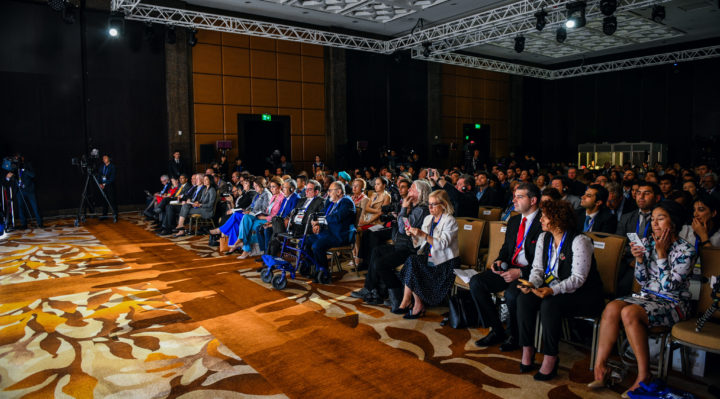
SESSION NO. 5 CRISIS OF TRUST. GLOBAL POWER BALANCE
Panellists from East and West, taking part in the 5th session, sparred verbally in a lively and sometimes noisy debate over trust in international relations and in national politics.
Moderator Stephen Cole, TV presenter from the United Kingdom, introduced the subject as a kind of Game of Thrones and asked the speakers for their thoughts on who will rule the new world. Had the legacy of consensus builders been replaced by risk takers?
The seven panellists from Asia, Europe and the Middle East spent the next 90 minutes arguing, sometimes furiously, about the future of international relations and national politics across the globe – and the lack of trust that was seen as fuelling tensions at all levels. The dangers of conflict loomed large in the exchanges.
Amid some disagreements, observers noted an unexpected degree of agreement on class warfare issues between two outspoken populists, Steve Bannon, American political strategist and head of Donald Trump’s 2016 presidential campaign, and George Galloway, British politician, broadcaster and writer.
Stephen Cole kick-started the discussions by asking Bannon whether President Trump had a strategic game plan to maintain the USA as a superpower.
“Yes, he has a pretty clear plan,” Bannon replied, and went on to describe his view of how President Trump was responding energetically to the challenge of changing global relationships, particularly with China, and their impact on national political trends in the western democracies.
The United States had tried to become an imperial power after the Second World War, using a liberal rules-based order, comprising capital markets and trade arrangements and an American security guarantee, but had actually been managing its own decline, he argued. This policy had led to discontent among the working and middle classes of the West, who were now seeking change through populist national sovereignty movements.
Bannon, who has been talking to politicians around Europe in the past months, predicted that the current European parliamentary elections would see the beginning of a political restructuring for the benefit of working class and middle class people all over the world.
Galloway agreed with Bannon that there was “a big sweep” going on in national politics around the world. He said he and Bannon had many differences but they came from similar working class backgrounds. “It’s our people who are asserting themselves. The rules-based order, or whatever it’s called, is an era that is coming to an end. The era of the elite is done,” he declared.
Galloway predicted that the European elections now underway would result in a stunning victory for his party, favouring Britain’s exit from the European Union.
Benita Ferrero-Waldner, President of Euroamerica Foundation, Austria, said the European Union was certainly in favour of maintaining the rules-based order. The alternative was the rule of the jungle, leading to all kinds of consequences, even war.
On the UK political situation, she said she still had some hope that a second referendum might allow Britain to stay in the EU.
Asked by the Moderator whether ‘liberals’ in the US and elsewhere should be worried by current trends, Mark Siegel, Head of the NYU Center for Global Affairs, said he believed there was a crisis in the way traditional governments and parties had viewed the situation. There were real underlying political and economic causes that all too often were dismissed.
“If the ethno-populists are successful they will want to break down rather than build up,” he warned.
Anna Hakobyan, Editor-in-Chief, Haykakan Jamanek newspaper, Armenia, argued that a rules-based order founded on mutual trust was the most important element in international relations, and mistrust was the most negative. Without trust, all kinds of conflict and tensions could develop, such as the current crisis between the US and Iran. Armenia itself had its own conflict with neighbouring Azerbaijan, due to lack of trust.
She pointed to the ‘Women for Peace’ movement, which she supports, as a potential means of building trust through the involvement of mothers and women generally.
Dr Jeremias Kettner, German analyst on global risks, said sports and cultural relations could also be really useful means of bringing people of different nations together and developing trust. “We need more empathy in the world. We need to teach this to our children in our educational systems. We need to look outside our bubble.”
He added that in a multilateral world everyone had to work together to achieve results, for example on questions like climate change. “These problems are too complex to solve alone,” he said.
Stephen Cole then turned the debate to current sources of tension in the world, including US relations with China, Iran and North Korea.
Bannon responded by declaring that China posed a great existential threat to the US.
The problem in relations with China was that for the past 20 years the capital markets elites in Wall Street, the City of London and global corporations had cooperated with the Chinese authorities in running a scam, building up a Frankenstein monster that had gutted working class people in America, China and elsewhere.
“The working classes have been eviscerated. There is no bond of trust, but nor should there be because these elites are not trustworthy. I’m working class and I know our people. They say they have had enough of this new serfdom. That time is over,” Bannon declared.
Mark Siegel said China would soon be the world’s largest economy. Its military was not up to the US standard but it was improving its conventional forces, while the US was spending vast sums on a nuclear war that would never happen.
On trade, America had closed its eyes to China’s predatory economic policies and intellectual property (IP) theft.
Mikhail Gusman, First Deputy Director of TASS, Russia, said relations between Russia and the United States went much deeper than the question of who was sitting in the White House. In the case of Donald Trump, he had made many promises about improving relations with Russia but nothing had happened. “Making any assumptions is just impossible at this time,” he said.
On China, he said this was a special case for Russia, with its common border and interests. “Building relations with China goes beyond trade. It is a more strategic problem”.
Benita Ferrero-Waldner agreed that China had not fulfilled its international obligations, for example by giving subsidies to state-owned companies and stealing IP, but the EU’s approach was to solve these issues through negotiation, not by a trade war. Such tension could lead to military conflict, which must be avoided at all cost, she warned.
“We need stronger leaders in Europe and we need to make a lot of reforms. We have to be tough and clear, but no trade war.”
Galloway said the world had egregious trade policies because it suited the elites of the West. “They don’t care if the workers’ lunch is stolen by China or anyone else, because they are sitting at a banquet.”
Prevailing orthodoxy says China is entitled as a sovereign country to pursue its own interests and policies, as is the USA, but “the fearsome potential of a trade war becoming a real war is a clear and present danger.”
The American authorities must be aware that war with China would be disastrous, but meanwhile they might be steaming towards a war with Iran that would be far worse than the war in Iraq. “I call for cool heads,” he added.
Galloway and Bannon, after largely agreeing with each other on social issues, then both started vigorously accusing the European Union of complacently failing to address the problems for many years.
Benita Ferrero-Waldner defended the EU’s record equally vigorously. “Shouting does not make good arguments,” she told Galloway. As the tone of the debate became more heated, moderator Stephen Cole intervened to calm tempers and bring the session to a close.
In final comments, Anna Hakobyan of Armenia said the fact that there had been so little trust between the panellists today was not a good sign for the future.
Stephen Cole, concluding, said there was so much anger in the world but at least this session’s debate – “mostly civilised” – had made a good contribution to international dialogue.
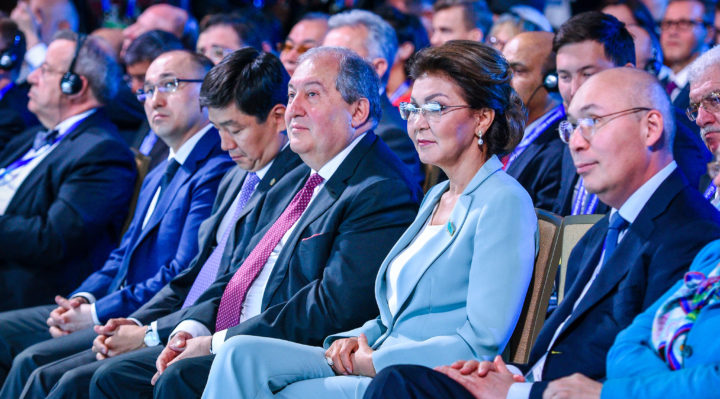
SESSION NO.6 BLOGGERS: THE NEW ROCK STARS OF THE VIRTUAL WORLD
Conference host Riz Khan introduced this session by asking if bloggers had taken over from TV stars as “the new Kings and Queens” of the media industry?
Dmitry Gordon, Editor in Chief of Ukraine’s Boulevard Gordona newspaper and founder of the Gordon online media outlet, said that 25 years ago he worked for one of the most popular Ukrainian newspapers with a circulation of 750,000. Seven or eight years ago it became clear that the newspaper was suffering and he organised his own website called ‘Gordon,’ which sometimes attracts 12-15 million people in Ukraine and Russia. His interview with the actor Volodymyr Zelensky in which he said he was going to run for President was seen by 25 million people. TV Channel owners also agreed that TV may die in a few years time as newspapers seemed to be doing.
“People can watch whatever they want, whenever they want and switch off the advertising.” TV is controllable by owners and politicians but the blogger decides what he is going to put on the blogosphere.”
Luis Miguel Lopez, Mexican Government Relations Specialist and member of the EECJS International Data Management Strategy Team, said we were all witnessing how traditional media was being replaced by the internet and social network revolution. “The ones that survive will have to adapt to this new reality.”
His company employed 22 bloggers with an average of 20 million followers each; two of them had 50 million followers. They reached far more people than any traditional media system “What we are seeing is a revolution based on new technological advances.”
Younger people did not like watching anything that lasted more than 40 seconds. “How are we going to make serious citizens of people who will not watch anything that lasts more than a minute,” Luis joked. In the near future thanks to Artificial Intelligence (AI) people would have their own bulletins customised to their own interests, read by an Avatar.
“We have so much information available that people’s tendency is to get only the information they want.”
There was a problem that a lot of the information was misinformation so traditional journalists with their training could survive but they had to adapt. Those that did adapt could be very successful.
Moderator Maksim Shevchenko, Journalist, broadcaster and social activist, asked Luis if his bloggers were just bloggers, or staff journalists.
Luis, “We have two journalists, the rest are specialist bloggers.”
Maksim asked Daniyar Ashimbayev, Editor-in-Chief of Kazakhstan’s biographical encyclopaedia, what should be done with bloggers who did not check the facts. Daniyar said actually only a few people knew how to go back to the archive and original documents to check facts and even Wikipedia used censorship. “If you try to edit an entry, you get banned for a few months.”
Individuals were responsible for their own accuracy and even Luis’s bloggers worked for an information company. This was one of the reasons that in Kazakhstan TV was number 1 and the chances of social media replacing it were very slim.
”Social media is a business paid for by advertising. You do not have full control and you are always interrupted by marketing or advertising.”
Tutta Larsen, Russian TV and Radio anchor and founder of Tutta TV, said she was a Videojournalist for NTV in the 1990s. She then became a TV host but the exciting thing for her was that the audience had come with her when she moved to the internet in her 30s and 40s. By then she had married and had children and the same life events had happened to many of her blogging audience. They now wanted to interact about the things that interested her – motherhood, her children and her relationship with her husband. If she had stayed as a TV host she would not have had the freedom to talk about her interests.
What interested people in the blogosphere was lifestyle and the dream of a pretty life, but TV would always exist for big shows and visual spectaculars because they could pull together lots of talented people and resources to make such programmes.
Kazakh showman, actor and screenwriter Marat Oralgazin said he did not consider himself a blogger but had worked in TV for many years. Everyone had to adapt to modern realities and be on youtube as well as TV. When he and the programme makers started putting information on youtube their programmes became more popular and the number of youtube users went up. The important task for TV was not to fall behind the times but to make sure the new technologies fed back to the TV programmes.
Maksim said when we talk about any media there is the issue of control. Many governments had learnt how to put the messages they wanted in front of their own people and he did not consider youtube and Facebook free. When videos about the Ukraine situation had gone up on websites people had complained that they had been altered.
Many considered Ukraine had a liberal press, Maksim asked Dmitry Gordon, but their TV Channels still had owners and presumably pressure came from them?
It was a war, Dmitry said, even though many had not even realised. Russia had a very powerful propaganda machine and many parts of Russian society and media were being used by this propaganda machine. “That is why we are showing what is happening in the war between Russia and Ukraine.”
Maksim said the issue of government bias was one of the ways of control. Young journalists were told they could write what they wanted so long as it complied with international standards.
Dmitry said he had had a dilemma on this issue with a journalist on his site, a rather brilliant journalist. An old friend of Dmitry’s was considered by many to be responsible for an impasse in Ukrainian politics. The journalist wrote an extremely critical piece about this man who was the Godfather of one of Dmitry’s children. Dmitry knew that the man concerned had been having cancer treatment for 11 years which might have been one of the reasons he had been behaving as he did. He therefore asked the journalist concerned to be merciful and not distribute the story.
“He said you are telling me what to write and he quit. I said ‘fine, you are a worthy citizen,’ but sometimes friendship is the most important thing.”
Maksim asked Luis if that was a dilemma with bloggers because there was no control?
Luis replied “There is freedom and they can do what they want but if they make mistakes their audience will leave them and they will make less money.”
“Mexico is six years behind the USA but that means we can see six years ahead and have time to adapt. Cable TV will disappear that is another tendency. You have to adapt to it.”
Daniyar said we had been talking about freedom of the press but it was a subjective issue. That could be seen with the example of Russia and Ukraine where respectable people on either side had completely opposing views.
Tutta said she thought Dmitry had been hypocritical because in the Russian Ukraine conflict both sides had used propaganda. People needed to learn how to filter information and use more ways to check facts.
Maksim said “The election of Zelensky is a chance to stop this horrible war.”
Dmitry replied “The end of the war is in the hands of God and Vladimir Putin. He started it and he is the only one who can stop it. And I would say to our Kazakh brothers ‘Be careful Putin can come for you too.’”
He also took issue with the statement that Ukrainians had been killing Ukrainians.
“Ukrainians have been killing Ukrainians but they did it with Russian arms brought from Russia, aided by Russian instructors and mercenaries, and it was Russia that came to our home.
Maksim said “Kazakhstan should become a place for Russian-Ukrainian peace talks. I could only meet Dmitry in Kazakhstan. Thank you Dariga for making it possible to have this dialogue.”
Marat said Kazakhstan was a beacon of friendship and understanding for many countries and it could act as a platform for productive dialogue.
“We are the great nation of the steppe where many civilisations have met and learnt to work together. It goes back to the days of the silk road. It has always been a place for dialogue.”
Returning to the social media – television debate, Dmitry said he had an audience statistic, 80% of people under 30 in Ukraine did not watch TV at all.
Luis added that there was no country in the world that could control the internet, not even China but there was no government that understood what people under 30 thought or wanted. They had completely different interests and could not be understood by the older generation.
Maksim said there was nothing new in this. The older generation never understood the young in the 1960s with the Beatles mop-top haircuts, rock music, LSD, Jim Morrison and the Rolling Stones, American young saying “We don’t want to fight for your country” during the Vietnam war and the hippy revolution, “ but things change and one day they will all turn 50.”
The majority of the panel clearly believed that bloggers are “the new rock stars of the virtual world;” that television is dying as well as newspapers and that the only way for traditional journalists to survive was to adapt.
Ukrainian panellist Dmitry Gordon thought Russia was solely responsible for the Russia-Ukraine conflict, the Russian panellists would like to see peace talks and it was agreed that Kazakhstan with its history of dialogue and as a meeting place of civilizations would be an ideal place for that to happen.
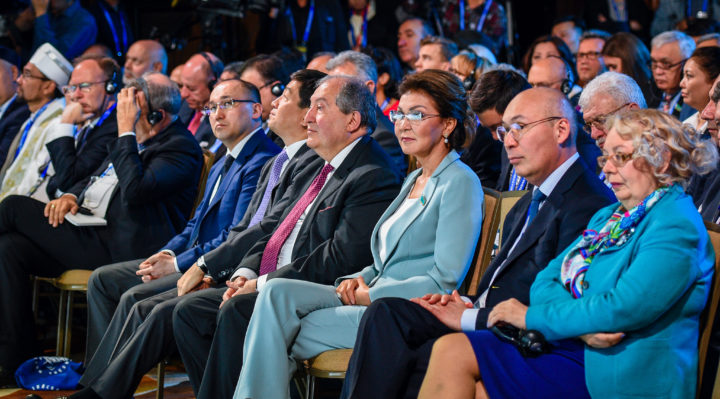
SESSION NO. 7 LEGAL OR LEGAL: MARIJUANA PUBLICLY AVAILABLE
The final session of the Forum tackled a specific social issue with global ramifications: should cannabis/marijuana be legalised?
After serious debate, the five-member panel gave the question qualified approval, for medical use, subject to national regulations. Some also favoured recreational use, with restrictions.
Moderator Andres Ilves, independent writer and journalist, UK, asked one of the panellists, a medical doctor, to start by explaining the science.
Dr Jerrol Thompson, CEO of the Medical Cannabis Regulatory Authority, St Vincent and the Grenadines, said those who argued that cannabis was always dangerous were wrong. That is what everyone thought prior to 1990. Research since then had shown that cannabis produced certain control elements, or receptors, that could affect the body in important ways, such as alleviating pain or sleep deprivation.
“We don’t know everything but we do know that medicinal cannabis has a firm place in treating certain problems,” Dr Thompson said.
Doses could be small and need not be smoked. They could be taken under the tongue, as cream, by patch or eaten, for instance as cake, he said.
The next panellist to speak, Will Jones III, is a community activist in Washington DC and campaigner against cannabis legalisation and commercialisation. He identified three different issues: decriminalisation, medicinal use and recreational use.
“I submit that the term medical cannabis is an inappropriate name for this. Morphine comes from opium. We harness it and use it as medicine but we don’t talk about legalising opium. We should talk of medicinal cannabis in a separate category,” he said.
Otherwise he was in favour of allowing responsible use, as for alcohol or tobacco.
Borut Strukelj, Professor at the Department of Pharmaceutical Biology, University of Ljubljana, Slovenia, said the legalisation of cannabis was a question for national parliaments.
As for medical application, this could vary according to the individual, depending on body mass and other factors. Cannabis had been found to be a remedy in three main types of disease: cancer, epilepsy and, to a surprising extent, multiple sclerosis (MS).
Zhibek Zholdassova, Head of the Center for the Treatment of Neurosis and Alzheimer’s Disease, Kazakhstan, identified three progressive stages in the symptoms produced by use of cannabis: first was euphoria, then sedation, and finally hallucination. The sedative stage was useful for its medical effects but the treatment had not yet been accepted as fully proved. The hallucination stage was dangerous for anyone prone to mental illness such as psychosis, particularly in young people up to the age of 20. Access to cannabis to adolescents should therefore be restricted because they were at greater risk of becoming addicted, she said.
The moderator asked if the panel agreed on the free use of cannabis if regulated and controlled by doctors.
Will Jones cautioned that regulation was often abused. The average user was a 30 year-old male who obtained a medical usage card for occasional back pain.
Angus Taylor, Founder of the Newleaf Cannabis retail Network, Canada, said he took offence at the idea that recreational use would be exploited by unsuitable users.
Stores in Canada were not permitted to advertise and must have opaque windows. “We have a very careful approach, ensuring that those who want to consume can have access but those who are more vulnerable are not exposed to it,” he said.
Will Jones said every system could be abused. There was a legitimate case for medical use but he did not agree that recreational use had any place in society. The threat was massive commercialisation by big tobacco and alcohol companies, who were already using billboard advertising in certain American states.
The problem was that these companies would not make sufficient profits if they only sold their products to responsible users. Therefore they had an interest in selling to users who already had substance abuse problems or to young people, who would become lifelong users. In Colorado 70% of suppliers even recommended their product to pregnant mothers.
The moderator asked whether countries should change their laws regarding the use of cannabis. For example, should people be free to use it in their own homes?
Dr Thompson recalled that cannabis had been banned internationally under a United Nations treaty in 1961. Any country could pass its own laws to permit use of cannabis, but only for medical purposes and research.
Angus Taylor said Canada still had laws that could lead to prison sentences, for example for selling cannabis to under 18s and inappropriate persons. Possession by minors was still a criminal offence. “I don’t expect that to change, but those who have served jail terms may have them expunged from their records.”
Zhibek Zholdassova said she was against imprisonment for consumption. People had to be responsible for their own use of cannabis, as they were for alcohol.
Dr Thompson said the discussion should take into account the fact that there were different types of cannabis. One type, CBD, could be used at home, whereas there might be issues about another type, TAC.
Will Jones said he was opposed to non-medical use but no one should be prosecuted for using cannabis in their own home. This was a waste of government and law enforcement resources. “What we are opposed to is commercial involvement in the industry, not allowing big tobacco and big alcohol companies to get involved. We know their records.”
Angus Taylor said it was a matter for national regulations. Every country should have a carefully regulated system, to guard against abuse by drug dealers and commercial interests.
Borut Strukelj agreed it was important for each country to have its own regulations, but not full legalisation. “Please allow us to keep cannabis extracts in the hands of doctors and pharmacists.”
The discussion ended with warnings of dangers and appeals for caution, together with praise for the research that had led to greater understanding of the ways that cannabis could be used to treat certain health problems.
Dr Thompson recalled that when he had practised as a GP in New York he had prescribed a lot of opioids because the pharmaceutical companies had said they were not addictive. He was ashamed to say that many of these patients had in fact become addicted.
Zhibek Zholdassova warned that most cannabis recreational users reached the third stage of having hallucinations, which could lead to uncontrollable behaviour.
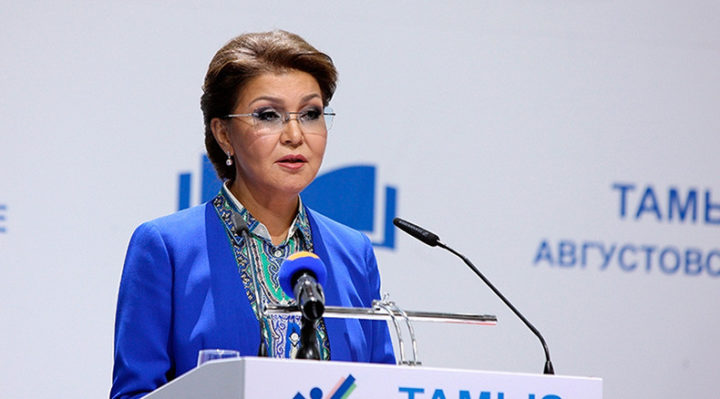
PANELLISTS FROM EAST AND WEST, TAKING PART IN THE 5TH SESSION, SPARRED VERBALLY IN A LIVELY AND SOMETIMES NOISY DEBATE OVER TRUST IN INTERNATIONAL RELATIONS AND IN NATIONAL POLITICS. MODERATOR STEPHEN COLE, TV PRESENTER FROM THE UNITED KINGDOM, INTR
Conference host Riz Khan introduced this session by asking if bloggers had taken over from TV stars as “the new Kings and Queens” of the media industry?
Dmitry Gordon, Editor in Chief of Ukraine’s Boulevard Gordona newspaper and founder of the Gordon online media outlet, said that 25 years ago he worked for one of the most popular Ukrainian newspapers with a circulation of 750,000. Seven or eight years ago it became clear that the newspaper was suffering and he organised his own website called ‘Gordon,’ which sometimes attracts 12-15 million people in Ukraine and Russia. His interview with the actor Volodymyr Zelensky in which he said he was going to run for President was seen by 25 million people. TV Channel owners also agreed that TV may die in a few years time as newspapers seemed to be doing.
“People can watch whatever they want, whenever they want and switch off the advertising.” TV is controllable by owners and politicians but the blogger decides what he is going to put on the blogosphere.”
Luis Miguel Lopez, Mexican Government Relations Specialist and member of the EECJS International Data Management Strategy Team, said we were all witnessing how traditional media was being replaced by the internet and social network revolution. “The ones that survive will have to adapt to this new reality.”
His company employed 22 bloggers with an average of 20 million followers each; two of them had 50 million followers. They reached far more people than any traditional media system “What we are seeing is a revolution based on new technological advances.”
Younger people did not like watching anything that lasted more than 40 seconds. “How are we going to make serious citizens of people who will not watch anything that lasts more than a minute,” Luis joked. In the near future thanks to Artificial Intelligence (AI) people would have their own bulletins customised to their own interests, read by an Avatar.
“We have so much information available that people’s tendency is to get only the information they want.”
There was a problem that a lot of the information was misinformation so traditional journalists with their training could survive but they had to adapt. Those that did adapt could be very successful.
Moderator Maksim Shevchenko, Journalist, broadcaster and social activist, asked Luis if his bloggers were just bloggers, or staff journalists.
Luis, “We have two journalists, the rest are specialist bloggers.”
Maksim asked Daniyar Ashimbayev, Editor-in-Chief of Kazakhstan’s biographical encyclopaedia, what should be done with bloggers who did not check the facts. Daniyar said actually only a few people knew how to go back to the archive and original documents to check facts and even Wikipedia used censorship. “If you try to edit an entry, you get banned for a few months.”
Individuals were responsible for their own accuracy and even Luis’s bloggers worked for an information company. This was one of the reasons that in Kazakhstan TV was number 1 and the chances of social media replacing it were very slim.
”Social media is a business paid for by advertising. You do not have full control and you are always interrupted by marketing or advertising.”
Tutta Larsen, Russian TV and Radio anchor and founder of Tutta TV, said she was a Videojournalist for NTV in the 1990s. She then became a TV host but the exciting thing for her was that the audience had come with her when she moved to the internet in her 30s and 40s. By then she had married and had children and the same life events had happened to many of her blogging audience. They now wanted to interact about the things that interested her – motherhood, her children and her relationship with her husband. If she had stayed as a TV host she would not have had the freedom to talk about her interests.
What interested people in the blogosphere was lifestyle and the dream of a pretty life, but TV would always exist for big shows and visual spectaculars because they could pull together lots of talented people and resources to make such programmes.
Kazakh showman, actor and screenwriter Marat Oralgazin said he did not consider himself a blogger but had worked in TV for many years. Everyone had to adapt to modern realities and be on youtube as well as TV. When he and the programme makers started putting information on youtube their programmes became more popular and the number of youtube users went up. The important task for TV was not to fall behind the times but to make sure the new technologies fed back to the TV programmes.
Maksim said when we talk about any media there is the issue of control. Many governments had learnt how to put the messages they wanted in front of their own people and he did not consider youtube and Facebook free. When videos about the Ukraine situation had gone up on websites people had complained that they had been altered.
Many considered Ukraine had a liberal press, Maksim asked Dmitry Gordon, but their TV Channels still had owners and presumably pressure came from them?
It was a war, Dmitry said, even though many had not even realised. Russia had a very powerful propaganda machine and many parts of Russian society and media were being used by this propaganda machine. “That is why we are showing what is happening in the war between Russia and Ukraine.”
Maksim said the issue of government bias was one of the ways of control. Young journalists were told they could write what they wanted so long as it complied with international standards.
Dmitry said he had had a dilemma on this issue with a journalist on his site, a rather brilliant journalist. An old friend of Dmitry’s was considered by many to be responsible for an impasse in Ukrainian politics. The journalist wrote an extremely critical piece about this man who was the Godfather of one of Dmitry’s children. Dmitry knew that the man concerned had been having cancer treatment for 11 years which might have been one of the reasons he had been behaving as he did. He therefore asked the journalist concerned to be merciful and not distribute the story.
“He said you are telling me what to write and he quit. I said ‘fine, you are a worthy citizen,’ but sometimes friendship is the most important thing.”
Maksim asked Luis if that was a dilemma with bloggers because there was no control?
Luis replied “There is freedom and they can do what they want but if they make mistakes their audience will leave them and they will make less money.”
“Mexico is six years behind the USA but that means we can see six years ahead and have time to adapt. Cable TV will disappear that is another tendency. You have to adapt to it.”
Daniyar said we had been talking about freedom of the press but it was a subjective issue. That could be seen with the example of Russia and Ukraine where respectable people on either side had completely opposing views.
Tutta said she thought Dmitry had been hypocritical because in the Russian Ukraine conflict both sides had used propaganda. People needed to learn how to filter information and use more ways to check facts.
Maksim said “The election of Zelensky is a chance to stop this horrible war.”
Dmitry replied “The end of the war is in the hands of God and Vladimir Putin. He started it and he is the only one who can stop it. And I would say to our Kazakh brothers ‘Be careful Putin can come for you too.’”
He also took issue with the statement that Ukrainians had been killing Ukrainians.
“Ukrainians have been killing Ukrainians but they did it with Russian arms brought from Russia, aided by Russian instructors and mercenaries, and it was Russia that came to our home.
Maksim said “Kazakhstan should become a place for Russian-Ukrainian peace talks. I could only meet Dmitry in Kazakhstan. Thank you Dariga for making it possible to have this dialogue.”
Marat said Kazakhstan was a beacon of friendship and understanding for many countries and it could act as a platform for productive dialogue.
“We are the great nation of the steppe where many civilisations have met and learnt to work together. It goes back to the days of the silk road. It has always been a place for dialogue.”
Returning to the social media – television debate, Dmitry said he had an audience statistic, 80% of people under 30 in Ukraine did not watch TV at all.
Luis added that there was no country in the world that could control the internet, not even China but there was no government that understood what people under 30 thought or wanted. They had completely different interests and could not be understood by the older generation.
Maksim said there was nothing new in this. The older generation never understood the young in the 1960s with the Beatles mop-top haircuts, rock music, LSD, Jim Morrison and the Rolling Stones, American young saying “We don’t want to fight for your country” during the Vietnam war and the hippy revolution, “ but things change and one day they will all turn 50.”
The majority of the panel clearly believed that bloggers are “the new rock stars of the virtual world;” that television is dying as well as newspapers and that the only way for traditional journalists to survive was to adapt.
Ukrainian panellist Dmitry Gordon thought Russia was solely responsible for the Russia-Ukraine conflict, the Russian panellists would like to see peace talks and it was agreed that Kazakhstan with its history of dialogue and as a meeting place of civilizations would be an ideal place for that to happen.

